#objective analysis
Explore tagged Tumblr posts
Text
Forensic Techniques in Paranormal Investigation: Applying Crime Scene Investigation Methods
Forensic techniques in paranormal investigation offer a rigorous approach to understanding unexplained phenomena. Indeed, applying crime scene investigation methods to alleged hauntings can elevate the credibility and objectivity of paranormal research. This approach emphasizes meticulous documentation, systematic evidence collection, and unbiased analysis, much like a criminal…
#and ethical ghost hunting.#Learn forensic techniques in paranormal investigation. Apply crime scene methods for credible evidence#objective analysis
0 notes
Note
Last question you might for now but how do you now feel about Toriel and Asgore as characters? Asking now cause with Toriel, there’s some now some heated debate about her being a bad mother and even person, mostly stemming from that jitterbug scene which some people see as confirmation of what was implied about her and Kris relationship in the first 2 chapters and with Asgore, there’s many (including myself) that believe he might actually join us in a dw next chapter, mostly due to the line Gerso said chapter 5 being about “a garden charred by an inferno of jealousy”, which, given the current situation with Asgore and Toriel and her blossoming relationship with Sans, seems to track pretty much.
All I can say about this personally is that I hope we get more development on the dreamurr adults from now on, especially my poor boy Asgore, since I’ve always wished to get a lot more development of him ever since he was kinda pushed aside in UT in terms of that and also cause I don’t want to remain a punching bag character in DR either. What you say?
this is a really interesting topic so I’m glad to have an opportunity to talk about it. I think the main problem we’re facing here is that, as fandom tends to do, there’s this all-or-nothing approach to how we view characters, especially women. they’re either Good or they’re Bad. the good ones deserve sympathy and the bad ones deserve scorn. so people are currently trying to fit toriel into that dichotomy
to start, no I do not think toriel is a bad person lmao. I also disagree that she’s overall a bad mother- who gets to decide where that line is, anyway? what I do think is that what she did in this instance was extremely irresponsible and speaks to the biggest issue plaguing the dreemurr family: a lack of understanding and communication. kris is unable to communicate what they’re going through, and toriel is unable to understand their feelings. she clearly deeply loves her child and wants them to be happy, and tries her best to make that so. but toriel is still a person with feelings of her own, and I think how she feels about asgore has formed a barrier between her and kris.
we have to remember that toriel is still going through what seems like an EXTREMELY messy divorce. she wants to move on, and she probably could have by now, but her ex follows her around and hounds her with romantic gestures every single day. she must be stressed and exhausted. from her perspective she just wants asgore to leave her alone already and stop interrupting her life, and I’m sure that makes it difficult for her to sympathize with kris, who still loves their father. when we see somebody as a bad, hurtful person, it can become really hard to understand the feelings of those who care about them. it’s not that she doesn’t care about kris’s feelings, it’s more likely she just doesn’t recognize them in the first place.
toriel must have felt so free for the first time in ages to just be dancing and goofing around with a new (most likely much younger) man. that doesnt excuse the fact that she never told kris where she was, and didn’t bother checking up on them in turn, and instead got so drunk she forgot or stopped caring about her responsibilities and really upset kris and susie. but it does help us understand why she would do something like that. I don’t think we can fairly cast judgement on toriel’s overall character based on this incident, all we can do is cast judgement on these specific actions.
moving onto asgore- I can’t lie, I’m not happy with the guy. he’s literally harassing his ex-wife and doing it in front of their child, sometimes even using kris as an unwilling agent in his plans. but I’m sure that’s not at all how he sees it. from his perspective, if he can just convince toriel that whatever Happened wasn’t his fault, or was justified, then they’ll get back together and everything will go back to the way it was. and he thinks that to convince her he needs to get her to sit down and talk to him, and he thinks that to do that he needs to woo her and remind her of her old love for him. these are not malicious actions, but he doesn’t understand toriel and her feelings at all, and doesn’t seem to be attempting to. he doesn’t understand how uncomfortable he’s making kris either. he’s only focused on this end goal of getting back to normal. he’s not a bad person, he’s just completely oblivious.
because of that, even if when we find out what he did or didn’t do it does turn out to not be his fault at all, there’s still no way that toriel is going to forgive him and it wont change the fact that how he’s acting now is totally inappropriate. it’s in the same way that understanding toriel doesn’t change the fact that she failed kris when they needed her. but I can’t call either of them overall bad parents or bad people. flawed, sure, but all parents are. making a final and damning moral ruling on either of them based on their actions in a very rough situation seems pretty foolish to me
#asks#deltarune spoilers#analysis#people are always just chomping at the bit to call toriel awful. they want it so bad#also it seems like the next dark world is most likely gonna be in asgore's flower shop#but i dont think that means he'll 'join us' in the dark world. i think at most he'll appear there as an objective in some way#like toriel did
507 notes
·
View notes
Text
Actual Ultimate Classpecting Guide
For real this time.
Buckle up, this is a really long one. For everything that's posited, I can provide textual evidence; that being said, I'm not going to be including the textual evidence within the essay itself, because it's already long enough as-is. As such, please feel free to ask for clarification or sources on any assertion, and I'll do my best to provide.
Before we begin, there's some things to discuss about how we're going to be approaching classpect in the following essay. In numbered list form for our short attention spans:
1. There is a concept Hussie talks about multiple times in his book commentary, "personality alchemy" - the idea that there are these "platonic ideals" of certain characters, which can be mixed and matched with others, in order to create new characters. The examples he gives are of how Eridan was a proto-Caliborn, how Kanaya has shades of Jade, how Nepeta was a proto-Calliope, and how Sollux and Eridan have shades of Dave in them. Classpecting is fundamentally a form of this personality alchemy:
2. Class describes the character's arc and emotional hurdles, while Aspect describes the character's base personality traits by which this arc is experienced.
3. For example, all three Seers struggle with hubris: Rose's need to be the smartest person in the room led to her being manipulated by Doc Scratch, Terezi's obsession with meting justice led to her engineering a situation where the only option was to kill Vriska, and Kankri's desire to be seen as a spiritual leader amongst his friends led to him furthering their divisions and harming them.
Then, when their pride is shattered, they cope by inflicting willful self-blindness: Rose turns to drinking herself stupid (the opposite of Light's sway over knowledge), Terezi gets down with the clown (the opposite of meting out Mind's justice, as it's a Gamzee W), Kankri goes celibate (Blood L) despite his clear romantic feelings for certain teammates.
4. As for Aspect: note how all three Life players share the personality traits of optimism, stubbornness, and obstinacy. All three Breath players share an immaturity and naïvety, and are quite frankly irresistible to people for some reason. All three Light players share a need for the spotlight and a tendency toward long-windedness and persnicketiness. So on and so forth.
What's interesting is, if you start analyzing characters that share Classes and Aspects, these specific types of similarity crop up over and over - all our Knights struggle with insecurities and facades, both our Bards have a crisis of faith. All three Breath players have an aspect of immaturity and childishness to their characters, and all three Light players are deeply concerned with appearing intelligent and feeling important.
5. As a result, this guide is NOT intended for classpecting real life people, because we are complicated, we contain multitudes, and we don't have arcs. This is primarily an analysis of what Class and Aspect mean in Homestuck based on textual evidence, because I genuinely believe that you can basically figure it out if you read carefully.
6. Duality, and the idea of "equal and opposite," are major themes within Homestuck - Prospit and Derse, Skaia (described as a crucible of birth and creativity) and the Furthest Ring (the literal afterlife). Which classes are involved in an Active/Passive split, and opposing Aspects, are the same way. This is the primary method I used to determine the Active/Passive pairings and opposing Aspects. After all, as Callie describes, both Thieves and Rogues are classes "who steal" - so, too, do I try to unify Classes by a common theme, even if they diverge wildly in how that theme is expressed (as Thieves and Rogues do). In the same way as the opposite of "up" is not "apple," but "down", because "up" and "down" are both fundamentally concerned with relative vertical position, so too can be defined concepts like Breath and Blood, Hope and Rage, Light and Void - as well as the reasoning behind Class pairings like Heir and Page, Maid and Knight, and Seer and Mage.
7. Descriptions for both Class and Aspect are left deliberately vague and up to interpretation within the comic itself, and this is by design: the actual manifestations of an Aspect can vary wildly given the Class, and even individual person, that it's tied to. Calliope even makes note of the fact that, under the right circumstances, someone can manifest effects that appear to be the opposite of their aspect. She's also careful to couch her language in "may" and "can" - because these concepts are intentionally somewhat nebulous and malleable. As such, while this guide certainly lays down what can be gleaned and inferred from the text, do note that Homestuck runs on a soft magic system, and as such, nothing stated is firm, 100%, must-always-be-this-way - just an overview of what we've seen.
8. There is often great overlap between Aspects, Classes, and Classpects - which Calliope herself notes. Heart and Blood are one of the most salient, as they both have a fixation on relationships, and Calliope mentions that under the right circumstances, a Classpect may even be able to manifest what appears to be the opposite of their Aspect. Again, Homestuck operates on a soft magic system, so this is a feature, not a bug.
ASPECT
There's a little less to say about Aspect, not because it's less complicated, but because "base personality traits" are much more nebulous compared to Class's sway over character arc. Still, Aspect represents the fundamental way a character is, and thus, color every interaction that character has. There's a reason Ultimate Selfhood is sought through Aspect, not Class - Aspect is the core of the character's being, what makes that person that person.
That all being said, Class has major sway over how an Aspect manifests, and certain classes can even invert the Aspect and even the character's role in the party. As such, these descriptions must be parsed carefully in relation to Class. Moreover, due to the soft magic system, there is at times overlap between unrelated Aspects, which can also be exacerbated by Class - Heart and Blood being the most obvious in this regard. Still, overall, you'll find the Aspects to be fairly distinct from one another.
Please also note that every Aspect can deal with its literal counterpart by default - Light players can wield lasers, Breath players can wield the breeze, et cetera. Because this kind of goes without saying, and because the non-literal stuff is more interesting to discuss, I'm not really going to go into too much detail about the literal qualities.
Finally, something interesting to note is that nearly every Aspect follows its own Hero's Journey cycle - full actualization for each one usually means reaching around to its opposite Aspect, and taking lessons from them - for example, Breath players need to learn maturity and responsibility, while Blood players need to learn relaxation and whimsy. Thus, an Aspect at its worst manifests in two ways - either a toxic overabundance of the Aspect's worst traits, or such a dearth of the aspect that it begins to resemble its opposite. Only by reaching into the opposite, however, can the player be tempered and reach full maturity - can they become more of who they are.
SPACE / TIME
Space and Time are both concerned with physical reality, goals, and the way one approaches them.
Space is associated with "the big picture" - with recycling, reproduction, and the interconnectivity of all things. The aspect also presides over the enjoyment of the journey over the destination - Space players serve as reminders that the present moment is as important as the end goal. Space is often a more passive Aspect, being the stage upon which the story is set. They're the hosts of the party, and the one who marks the ending.
Its players reflect these tendencies, often being feminine, with penchants for life-giving acts such as gardening. Their personalities tend towards frivolity and silliness, finding it difficult to stay on-topic or bring full gravitas to serious situations. Perhaps a better word would be "distractable;" when the aspect is so concerned with all things in connection with each other, it's easy to lose track of details, and it's easy to enjoy things simply as they come. Space players tend to be kind, patient, and forgiving, which is a strength as much as it is a flaw; it's easy for malicious actors to take advantage of this compassion, or for the Space player to find themselves in a poor situation by being overly permissive. They can easily be painted over by stronger personalities, and tend to struggle with romantic relationships, as they attract many with their kind and giving natures, and few are naturally so considerate of the Space player in turn.
"Passive" is a good word to use; at a toxic overabundance of their Aspect, Space players are trampled underfoot. They become enablers, servants to dark forces, or so lost in their own worlds that they neglect the one they live in. With their Aspect "inverted," a Space player becomes a demon of poor prioritization. Distracting not just themselves from their true purpose, but others, too, the Space player will wreak havoc by overemphasizing unimportant topics and ignoring important tasks. This superficially resembles Time, in that the Space player will become fanatically dedicated to their task, but note that the poor prioritization is still Space-esque at its core.
Still, within this nadir is a valuable lesson: the strength of self-assertion, and the determination to see a goal through. These will allow the Space player to weed their garden, separating good from bad, allowing it to flourish like never before.
Time, in contrast, is associated with "the little things" - with details, minutiae, and processes. Time presides over the struggle toward something greater, the endurance of hardship with an eye on the prize - the destination over the journey. Time players are the ones keeping track of the tasklist, marking off each item as it reaches completion; they are the tireless workers keeping the whole engine running.
Time players, thus, are ones whose lives are marked by struggle. They are highly goal-oriented; in contrast to how Space players can easily move from goal to goal, task to task, Time players feel bound to see things through to the end, finding satisfaction only when they've achieved their desired result - and only until they come across the next goal in their journey. A Time player isn't happy without a goal to work towards, a craft to polish, a prize to win - but this driven nature can easily be its own downfall, as it leaves little room for the player to admit to their own shortcomings, or ask for help from others. Moreover, their focus on minutiae can leave them blinded to the bigger picture, and it's easy for a time player to fall to despair, able to do nothing more but spin their wheels. They're prone to directionless anguish, frustration, and resentment towards the seeming futility of their actions, becoming destructive and defiant even when it doesn't serve them to do so.
At a toxic overabundance of their Aspect, Time players become explosively destructive. The ultimate "goal" of all things is death, with which Time is associated, and accordingly, Time players have a penchant for aligning themselves with futility and entropy, struggling so hard that their thrashing leaves a trail of annihilation in their wake. With their Aspect "inverted," Time players detach entirely - they can become so fed up with struggle that they simply opt to lay their weapons down and let the end take them. It's very easy for them to come to the conclusions that either everything matters, or nothing matters. This superficially resembles Space and its big picture thinking, but note that its framework of struggle, and whether or not a goal needs to be pursued, makes it a Time concern.
But the inherent meaninglessness of existence is, in itself, an important realization to make - that whether or not anything "matters" in the grand scheme, things can still be worth doing, worth caring about, and worth investing in. This realization allows the Time player to attack their goals with renewed vigor and greater clarity, which in turn means that the party becomes an efficient, well-oiled machine.
BREATH / BLOOD
Breath and Blood are both concerned with directionality, interpersonal relationships, and autonomy.
Breath is the Aspect governing freedom, liberty, and independence; it is a force that breaks shackles, clears out social norms, and refutes "the rules," whatever those rules may be. Breath players can't be tied down, whether by physical bonds, societal rules, or even the ineffable forces of the narrative itself. They are leaders of example, pioneers, and trailblazers, opening new paths for their teammates to follow.
Breath players are goofy and gullible, often with hearts full of childlike whimsy, naivety, and even immaturity. They are friendly and well-meaning, fond of simpler things, and easily swayed by others. They approach the world with a sincere and innocent good-naturedness, like a baby animal before it learns to be fearful of danger. Something about this sincerity seems to make Breath players irresistible to others, and they often find themselves the subject of romantic attraction. However, in this childishness is also the great pitfall of many Breath players - their natures are naturally conflict-averse, and egotistical the way a child can be, failing to see beyond themselves. They can be incredibly callous when not considering the consequences of their actions, or the viewpoints of others.
At their worst, Breath players are irresponsible and callous. They'll shirk the consequences of their actions, blaming anybody but themselves, or simply choose not to care who they hurt in order to get what they want. They may even choose to stop making choices for themselves, leading to the "inversion" of their Aspect - a voluntary loss of freedom and independence, derived from an Breath-like aversion to responsibility, which superficially resembles the bondage of Blood.
But if they are able to overcome these tendencies, a Breath player will learn what true responsibility looks like - responsibility for themselves, their choices, and the effect they have on others. Armed with this, a Breath player's ability to break bonds can be focused into a clear force for good, clearing away all obstacles and harmful societal standards, leading the charge into something new and beautiful.
Blood, in sharp contrast, is the aspect that governs bondage, contracts, and interdependence. It is a force that binds. Under Blood's sway are not only romantic entanglements, but familial, friendly, and societal ones as well. This aspect sees overlap with Heart, but the division is this: Heart concerns itself with feelings, and Blood concerns itself with compatibility. Blood players are diplomats, forces that remind us all that we are more similar than we are different, and that that similarity should bring us together when we are on the verge of pulling apart.
Blood players, reflective of their Aspect's association with bonds, tend to be neurotic and obsessive. They have a tendency to over-examine and overthink, constantly fretting over the infinite and infinitesimal variables that influence the shape of society and interpersonal relationships. However, this judgmental nature stems from a deep well of idealism and empathy; Blood players can't help but care about others and wish for the best for them. In a way, this makes them one of the most mature members of the team, being concerned with its overall well-being. Unfortunately, their prowess does not extend inwards, and their assessment of themselves is usually direly incorrect - all the worse because Blood players always feel responsible for those around them. Blood, being the Aspect concerned with interdependence, is the weakest one when all alone.
Thus, it's easy for the Blood player to wind up controlling - desperate to make sure everyone is moving according to their vision, they'll become iron-fisted dictators, with a "my way or the highway" approach to social interactions. It's easy for them to wind up pariahs of their own making, becoming so critical of others, or so adamant about enforcing their own will, that they inadvertantly sever their ties - something that superficially resembles Breath's independence, but is truly a result of Blood's neuroticism.
But with that space and separation can come great clarity. Blood players must learn to relax their grip, and allow people room to breathe - including themselves. Once able to grasp that sometimes bonds must be forged with a soft touch, Blood players' natural empathy shines through, allowing them to build something so much kinder and greater than the sum of its parts.
LIGHT / VOID
Light and Void are both concerned with knowledge, ontology, and "narrative relevance".
Light (as well as its counterpart) are perhaps best understood through the lens of "narrative" - this idea that, of all things that do and don't exist, and all events that do and don't happen, only the ones put to page are "relevant". Thus, Light is associated with knowledge and luck - that is to say, it's associated with the knowable, the objective, and the concrete, and the ability to determine "important" events. Light players have read the book they're participating in, and able to serve as luminary guides from one plot point to another, lighting the lampposts for others to follow.
Light players, naturally, are erudite and educated, possessing keen intellects and cunning minds. They are fond of knowledge itself, of markers of status and prestige - whether that's wealth, the adulation of the masses, or a massive library. They harbor a desire to be important, to be seen, to be acknowledged, and are happiest when they are looked up to. Conversely, they deal poorly with being looked down upon. Their confidence transmutes easily into hubris, and they struggle with having that pride challenged. As such, they tend to be volatile and unpredictable, quick to retaliate against those who threaten their egos, or obsequious to those whose acknowledgement they desire.
Their desire for the limelight can quickly spell disaster - they can become incredibly cruel, harsh, and egotistical in their pursuit of narrative significance. They forget, in their obsession, that they, too, are fallible and flawed, and the inevitable reminder can come very harshly. Light players struggle with moderation, and as such, when they feel shame, they'll often take drastic measures to cope with it - deliberately darkening their own influence or intellects, removing themselves from the "story" entirely - something which superficially resembles Void's penchant for the background, but which is firmly rooted in Light's obsessive need for drama.
But in experimenting with narrative insignificance, Light players can reach an epiphany - in their absence, others may shine, and that can be a wonderful thing. Light players, then, can learn to shine not just for their own sakes, but for the sake of others, allowing them to weave a story even more brilliant than any that can be weaved alone.
Void, in contrast, is the blank spaces between the words. That which is secret, subjective, unknowable - these are Void's domain. It's associated with taboos and hidden things, sexuality and pleasure. It's also associated with the empty canvas - the blank space before creation, and the oblivion to which creation is eventually destined for. Thus, it stands for infinite possibility, though the collapse of those possibilities into a reality removes that reality from Void's domain.
Thus are Void players ever cosigned to the background, though this generally suits them fine. Void players are very self-possessed. Where Light players tend to exaggerate and complicate, Void players are honest and simple, preferring straightforward solutions. They don't tend to think very hard, instead letting intuition and emotion guide them to where they want to be - which makes them one of the more stable personalities on a team. However, this simplistic, feelings-driven approach often leads to pleasure-seeking behavior, poor impulse control, and overindulgence in vice, and from there, to irrelevance, with which Void is so closely interlinked.
Void players are especially prone to vice, and at their worst, will become so drunk on pleasurable activities that they pursue them to the active detriment of the party's goals or the Void player's self-improvement - making them the ultimate irrelevant character. They can also very easily drag others into their mélange, with a forcefulness that resembles Light's illuminating guidance, but which is ultimately rooted in Void's pursuit of personal pleasure.
But there's a lesson to be learned in Light's domain: how to bring themselves into relevance and greatness. A Void player, once they learn to pursue not just personal pleasure, but a greater satisfaction for the collective whole, can drag the Void behind them, kicking and screaming, to where it'll be of use.
MIND / HEART
Mind and Heart are concerned with what it means to be a sentient being, with identity, and with why we do what we do.
Mind is the Aspect associated with logic, rationality, karma, ethics, and justice. To a Mind player, they "are" because they "think". They are keenly aware of the consequences of every action, and well-versed in cognition and behavior, such to the point of manipulating others with ease. Deeply concerned with the "effect" of cause-and-effect, Mind players are always cognizant of debts and credits, where justice is owed and where it has been over-meted, and their subtle machinations culminate, like well-placed dominoes, in grand and explosive finales.
Mind players are schemers - it's in their nature. They have a tendency to view the world as a puzzle or game, with themselves and the people around them as pieces on a board, and set as their standard rules the laws of ethics and karma - owed debts and overhanging credit - guilty and innocent. Mind players are wickedly cunning, and have an high success rate with every scheme they commit themselves to, but the grand downfall of all these tendencies is that they tend to lack in a sense of identity, and have a poor grasp on their own emotions or desires. While they may know how to provoke a desired reaction, they don't know how to change someone's mind. They often find themselves grappling very painfully with their own selfhood, with feelings of emptiness, inadequacy, or uncertainty.
Thus, a Mind player at the worst zenith of their Aspect is heartless and cruel. Leaving no space for empathy or even personal feelings in their plans, the Mind player will plot for an ending as heartless as they are. But a Mind player is never truly without emotion, and ignoring their own feelings causes them to manifest in terrible ways - Mind players have a tendency to seek toxic, codependent relationships, hoping to find external validation, subjecting themselves to the wishes of others, which can appear like Heart's fixation on feelings and desire.
But in recognizing their own need for emotional validation, and the importance of their own feelings, a Mind player can realize that there's an entire dimension to the game they've been playing that they've been ignorant of. When a Mind player learns to temper their schemes with empathy, compassion, and kindness, how much more success they'll see - and how much happier that grand finale will be!
Heart, then, is associated with feelings, motivations, intuition, the soul, and the self. To a Heart player, they "are" because they "feel" like they are - and they're keenly aware of the multitudes that are contained within themselves. Deeply concerned with the "cause" of cause-and-effect, they're drawn to desires, those of themselves and of others, especially where strong feelings are concerned. Heart players are gifted with an intuitive understanding of those around them, both their good and bad qualities, and are tasked with the grand task of bringing out the best.
It stands to reason, then, that Heart players have a firm grasp on who they are and what they want. For the same reasons, it's difficult for a Heart player to truly hate or condemn another person, because they are so adept at understanding them. However, this understanding comes with a price - because the Heart player is so aware of themselves, they can't escape their own worst traits - nobody self-loathes as accurately as a Heart player can. Nor can they ever truly be untruthful with another, making them poor manipulators. Capable of presenting a different facet of themselves as the situation calls for it, certainly, but just as it's impossible to lie to a Heart player, who always knows how someone really feels, it's impossible for a Heart player to lie to themselves.
With this sincerity comes vulnerability. Heart players wear theirs on their sleeves, and at their worst, this can make them demanding, needy, and sensitive - so eager to connect with others emotionally that they'll cramp themselves to fit others' desires. But they can't ever keep this up for long; Heart players have a tendency to withdraw from others after being hurt too often, finding it easier to be alone and silent about their feelings than to deal with the pain of rejection. They may even work to manipulate others, preying on their emotions and desires to force them to act in their worst interests. This superficially resembles Mind's cold logic, but unlike Mind's cool rationality, Heart's aloofness is a mask, an attempt to avoid pain by pulling away.
But this isn't purely a negative, because a Heart player can learn a healthier form of detachment, and separate out healthy and helpful desires from harmful and detrimental ones. Given this clarity, the Heart player becomes the team's emotional core, able to raise up each teammate's best qualities, while helping them deal with their worst, enabling everyone to be the best possible version of themselves - which the Heart player knew them to be all along.
LIFE / DOOM
Life and Doom are concerned with outlook, with journeys, and with trials and tribulations.
Life is an aspect concerned with healing, growing, and improving. It is associated with beginnings, optimism, and positive emotions. The very essence of Life lies in its healing abilities, in this idea of overcoming the odds and triumphing over hardship and difficulty. Life is action, movement, and motion, and its players can scarcely hold still. Life will find a way - and Life players harbor the same immutable belief; they are the most stubborn weeds in the garden, the cockroach that survives the apocalypse, and the beating heart that refuses to stop.
Life players tend to be optimistic and confident. They are self-assured individuals, with a stubborn belief that good things are on their way, and any hardship they face is not only temporary, but something that can be overcome. They can find the silver lining in any cloud, and enjoy themselves under any circumstance. They love to nurture, to care for others, though this love has a tendency to be one-sided. Indeed, Life's stubborn nature is its players' greatest pitfall; their persistence easily becomes obstinacy, and their confidence can become condescension. Their self-assured nature easily becomes egotism, and they can have great difficulty grappling with those who don't share their views - even coming to oppose those who bring emotional pain and suffering that can't be easily fixed.
It's very easy for a Life player to decide another person isn't worth their attention, and opt to leave them behind - after all, Life has to move forward, no matter what it tramples in the process. At their worst, they're stubborn to the point of not listening to anyone but themselves, confidence becoming blockheadedness. This focus on forward progress without looking back can even cause Life players to become harmful to others, so focused they are on their own growth that they don't notice that they're choking everyone else out. This may resemble Doom's death in its worst case - arresting everything else, eventually blocking even their own path with unruly, out-of-control fecundity.
Thus, a Life player needs to learn to more gracefully accept Doom's influence - to pause, slow down, and consider viewpoints that are negative, unpleasant, or difficult. A Life player, endowed with moderation, will be able to cultivate a bountiful garden, rather than an unruly jungle - a place for all to flourish and live in plenty, never wanting for anything.
Doom, then, is the aspect concerned with death, with rest, and with endings. Doom is associated with suffering and with negative emotions, with peace, with sleep, and with dreams. Doom players have a natural penchant for prophecy, and are often dual dreamers, able to take advantage of both Skaia's oracular clouds and the Horrorterrors' voices over Derse. All things must eventually come to an end, and not all times will be good; in these troubling times, Doom players shine, as they are the guides who call the murk home, and know best how to navigate rough waters, course-correcting until the storm passes.
Doom players tend to be deeply pessimistic. They experience, to a much more magnified degree than others, negative feelings and impulses, and it's difficult for them to see the world without seeing its flaws, first and foremost. They are not healers, but commiserators, those who understand greatest that sometimes there's no way to deal with tragedy but to simply sit with it and wait for it to pass. The counterpoint to Life's insistence on breathless positivity, Doom is a reminder that pain, grief, sadness, shame, and guilt are not unnecessary things - in fact, excising them can lead to terrible consequences. Doom players are the universe's martyrs, often taking it upon themselves to course-correct, to sacrifice themselves in order to give others a chance to continue on, to avert a terrible fate.
Unfortunately, this tendency also brings with it a tendency for Doom players to wallow in misfortune, or worse, to take themselves out of the picture, giving up entirely on seeing a better ending. As if energized by their own sense of futility, a Doom player at the "inverse" of their aspect may seem to echo a Life player's focus on forward progress and motion, actively spurring their team on towards an untimely demise.
A Doom player must learn to harness this sense of progress for good, rather than harm. A Doom player, once able to grasp the joy of life even in the greatest depths of despair, will be able to fill even the darkest hours with peace, meaning, and hope.
HOPE / RAGE
Hope and Rage are concerned with permission, and are the lens by which we define reality.
Hope is described by Hussie in the book commentary as being "framed as the most powerful aspect" because it is, literally, an aspect that defines reality. Its specific ability is lies in reducing the "fakeness attribute" of something, thus making it "real". Hope is associated with convictions, with idealism, with faith, order, holiness, and, of course, with magic - which Hope turns real. Hope is permission itself - a reality-breaking ability to look at the world and decree that it must be another way, a way in which the Hope player believes it ought to be.
Thus, Hope players tend to be hard-headed zealots, with no self-awareness whatsoever. Their inclination towards powerful beliefs makes them very difficult to dissuade from a path they've set their minds to, and their specific suite of abilities makes them terrifyingly likely to make their vision come true. Hope players are usually not particularly cunning, nor particularly intelligent, nor even particularly empathetic. Given the Aspect's focus on conviction and faith, it's usually very difficult for Hope players to notice anything occurring beyond their own minds and feelings. Thus are Hope players hopeless optimists, hopeless romantics, and hopeless in general - often great sources of embarrassment to their teams, as their naked sincerity is painful to witness. However, their ability to define reality does not leave them when their beliefs are faulty (which they often are, given Hope players are not particularly introspective, either), which is what makes a Hope player so dangerous.
A Hope player can easily be set on the wrong path - as convicted as they are, and as difficult to shake from that conviction as they can be, Hope players can easily march down a path of destruction, if not persuaded with a deft touch and gentle guidance. In the event that their faith is broken, Hope players easily become despondent and lost, floundering and wishy-washy, which superficially resembles Rage's self-consciousness, but is truly just a lack of direction.
But Rage has a powerful lesson to teach Hope players - that of questioning themselves, interrogating their own beliefs. Once their convictions have gone through rigorous scrutiny, revised into the best, brightest versions of themselves they can be, a Hope player is a worker of miracles - speaking into existence a beautiful future on faith alone, proclaiming that how they see the world is how the world shall be.
Rage, then, is the power of denial. If Hope reduces the "fakness" of a thing, then Rage reduces its "realness". Rage, too, is a means of defining reality, in this case taking a torch to the aspects of reality that it rejects. In more passive Classes, this works in subtler ways, stoking others towards destructive fury. Rage is associated with anarchy, chaos, revolution, destruction, anger, and nihilism. A Rage player will not suffer a world that does not satisfy them, breaking it to pieces, such that something new can take its place.
Therefore, Rage players are prone to harboring anger and resentment, discontentment with the status quo, and faith only in that what currently exists must somehow be dismantled. However, unlike Hope players, who can't help but be pathetically sincere, Rage players are incredibly self-conscious, and often try to mask and hide their embitterment and anger. This, ironically, leads to further ostracization, as others can tell they're being inauthentic. This only further compounds their sense of alienation, and drives them further into smoldering resentment. This makes Rage players sound volatile and dangerous, and they are - but the same fury that moves them is the fury that ignites revolts and tears down oppressive regimes, a necessary and vital well of energy and momentum. It takes careful handling to ensure that the team's Rage player can channel this energy towards righteous causes, rather than marking all as a target for their destructive ire.
In the worst-case scenario, the Rage player turns that rage out indiscriminately, deciding that there is nothing worth fighting for - only unpleasant things to be brought to ruin. This is Rage at its toxic overabundance. Conversely, a Rage player can retreat so harshly into their mask that they allow others to dictate their beliefs, taking them to heart - an action motivated by Rage's destruction (this time, turned inwards) that superficially resembles Hope's convictions and faith.
The true path for a Rage player is a healthy balance - to allow themselves some of Hope's sincerity, and by doing so, to become more sincere and true. This will let them release the pressure of their mounting ire, such that it can be converted into productive, rather than destructive, energy - the heralds of a revolution, razing away the faulty, corrupt old systems such that something better and new can take their place.
CLASS
As previously stated, Class governs a character's character arc - the character's starting circumstances, whether their conflict is primarily internal or external, and what major aspect of their Aspect becomes a hurdle for them to overcome.
In the same way an Aspect's sways tie into the character's base personality, the character's Class abilities tie into the kinds of struggles they face, and have great influence on how their Aspects manifest.
That being said, a character - and their Class - are always subject to their Aspect, as their Aspect is tied fundamentally into who they are. Thus, it can be said that a Light player will always have an affinity for knowledge and provide Seer-esque guidance even when not in a Seer role, a Doom player will always have prophetic abilities even with a non-prophetic class (note that Mituna, an Heir, still had prophetic visions, despite those generally being the realm of Mages and Seers), and a Life player will always have a penchant for healing, even paired with a destructive Class like Prince or Thief (the Condesce, after all, could still extend life; a Prince of Life would likely manifest not as one who causes plants to wither and die (this would actually suit a Prince of Doom), but one who destroys in the way of nature overtaking an abandoned shack, or a forest breaking down a body).
This means that when a character's Classpect inverts their Aspect, it doesn't mean that they suddenly become a hero of the opposing Aspect - rather, it means that, at their very worst - at the nadirs of their character arcs - they will lean so much into their Aspect's worst traits that it will superficially appear as the opposite, when all it really is is an absence of themselves. Dave, a Time player, usually so attentive to detail (despite his disaffected facade, he's always paying rapt attention to Karkat's rants, and noticing all the clues pointing to his destiny of defeating LE), at his lowest emotional point (arguing with Grimbark Jade after sobbing about his lost childhood whimsy), states that he doesn't think Lord English is that big a deal, and never even did anything directly bad to him or his friends - when he was literally directly haunted by LE via Cal his entire childhood. Similarly, Rose drinks herself stupid in order to cope with her mother's death.
Note how, superficially, this almost appears to be an invocation of Space's "big picture thinking," its passivity and permissibility, or how Rose's case appears to be Void's tendency to indulge in vices and pleasure - but they're not. Time's worst traits superficially resemble Space, Light's resemble Void, and vice versa - Grimbark Jade is the Condesce's taskmaster, and Porrim at her worst was as much of a nag as Kankri, trying to do a Time player's managerial job. Horuss and Equius at their worst won't shut up and won't stop talking over their partners. So on and so forth.
Finally, Calliope tells us a couple things about Active/Passive pairings. The first is that Calliope introduces the idea of paired classes with the idea that both Rogues and Thieves "steal" (and later, that both Princes and Bards "destroy"). This presents the idea that both classes can be roughly summed up with the idea that every pairing can be summed up with a common theme.
The second is her description of what makes a Class Active versus Passive - that Active Classes move their Aspect to benefit themselves, whereas Passive Classes allow their Aspect to be moved in order for others to benefit. In a way, they're like active and passive voice in grammar (to tie in with the way Classes and Aspects are so tied to ideas of narrative and character arc) - an Active Class performs their Aspect, and a Passive Class allows the Aspect to be performed "by others" (the famous piece of advice regarding telling the two apart being that a sentence written in passive voice can have "by zombies" tacked to the end of it - eg, John is attacked "by zombies", as compared to active voice - John attacks).
Thus, the Class pairings, along with their basic themes, are as follows:
KNIGHT - / MAID +
"One who controls."
Knights and Maids are paired together through two key factors: the first is that they both hold leadership or managerial roles; the second is that both classes carry the connotation of serving a Lord. Fittingly, they are both struggle with the control of malicious forces - Knights with prophecies indicating their role as heroes, Maids with direct usurpation by malicious forces.
PAGE - / HEIR +
"One who inherits."
Pages and Heirs are paired together because they both fundamentally deal with the great inheritances placed before them. Pages can come into incredible, limitless power - but they must struggle and work hard for it; Heirs begin the game in societal comfort and wealth, and must learn to defect from their decadence.
THIEF - / ROGUE +
"One who steals."
Thieves and Rogues are highly adaptable, as Thieves are capable of fantastic on-the-fly adaptation, whereas Rogues have an infinite toolbox at their disposal. They are both provocateurs, shakers of the status quo, though the Thief does so for personal gain, while the Rogue does so to right injustice.
MAGE - / SEER +
"One who guides."
Mages and Seers are tied together by the gift of prophecy and future sight. Seers are privy to the endless branching paths that the future may take, while Mages are gifted with the ability to outright determine a future that will certainly happen, appearing to be prophecy.
WITCH - / SYLPH +
"One who changes."
Witches and Sylphs are individuals blessed with great magic, but poor judgement. Sylphs heal and nurture, but are drawn to those with strong desires, and enable them to cause great harm; Witches, meanwhile, possess strong emotions, which they often use as moral guidance, for better or worse.
PRINCE - / BARD +
"One who destroys."
Princes and Bards are representatives of society - the one who determines its course, and the one who recounts its passing. Princes suffer from a toxic overabundance of Aspect, and are prone to spectacular meltdowns, whereas Bards are always poised for a crisis of faith. Both are responsible for catastrophic failures - but also breathless victories.
INDIVIDUAL CLASSES
KNIGHT
"One who controls [Aspect] or controls using [Aspect]."
Knights are frontline warriors, rallying points behind which the party falls into line. Although they are often leaders, just as often, they are logistical planners, strategists, or simply the team's beating heart. They are almost always thrust into positions of narrative significance, often carrying grand destinies or even outright heroic prophecies on their shoulders. The are the party's rallying force, its center, and a guiding light - the one to lead the charge, behind which the party will follow.
The primary character struggle a Knight will have is with crippling insecurity. Knights are prone to self-loathing and imposter syndrome, and will often adopt a façade in direct opposition to their aspect (ie, their fundamental personality) in order to cope with their feelings of inadequacy. Thus, their relationship with their aspect becomes love/hate - though they're naturally drawn to their aspect, and even naturally skilled at utilizing it, they have a tendency to become their own worst enemy, as their insecurities make them push their façades, and their façades distance them from their aspect.
"Controlling their Aspect" means that the Knight has easy access to their Aspect, wielding it like a tool or weapon - for good or for ill; "controlling using their Aspect" is what grants Knights their leadership abilities, able to dictate how others ought to act in accordance with the Knight's Aspect - whether their understanding of their Aspect is high or low, whether their advice is good or bad.
Therefore, at their worst, a Knight will fall prey to their insecurities, retreating into their facades, rejecting their Aspect, which will allow disharmony or misuse of it to proliferate throughout the team. They may even wind up deliberately twisting their Aspect's presence within the team so that they never have to be confronted by it; these distortions ripple outwards and eventually culminate in major catastrophes, all on account of the Knight's negligence.
But at their best, a Knight is a shining beacon and guiding light; when they come to terms with themselves, and allow themselves to be comfortable in their own skin - when they no longer allow themselves to be ruled by their insecurities and anxieties - they ensure that their aspect is harmonious wherever it appears throughout their party, and can wield it expertly as a weapon, as if it were their own flesh and blood.
MAID
"One who allows control through [Aspect] or allows [Aspect] to be controlled."
Unlike Knights, which take positions of frontline prominence, a Maid is a managerial presence in the backlines, though no less crucial for the smooth functioning of a party. Just as the invisible hands of the hired help keep a household running, the Maid will be called upon to provide vital services to keep the game stable, even if those services are more noticeable by their absence than their presence. Maids are often the party's unsung heroes or even shadow leaders, tugging at invisible strings, fingers on the pulse.
A Maid's primary character struggle will be that of escaping oppression. Maids tend to start the game in positions of subjugation or subservience, especially to malicious forces, and their abilities often end up being exploited to serve their masters' ends. Therefore, one may even have the impression that a Maid is ruled by their aspect, held prisoner and slave - at least until they're able turn the tables.
"Allowing their Aspect to be controlled" means that Maids are capable of directly dispensing their aspect unto others - a Maid of Time can dispense time unto foes, pausing them in their tracks; a Maid of Life can grant so much life that they can revive the dead. Their boons are great and direct, straightforward in a similar manner to Knights. "Allowing control through their Aspect" grants them their uncanny managerial abilities, as their aspect dictates the realm in which nothing occurs without the Maid's knowledge or permission, a realm made available to whomever the Maid's allegiance lies with.
Thus, at their worst, the Maid becomes a saboteur. Exploited by malign forces, their abilities to allow control over others through their aspect, or control of their aspect, makes them perfect vehicles by which their aspect can be hijacked or usurped, and made to turn against the party, and they often find themselves placed into these positions through no fault of their own. It takes the party banding together to shake off the forces that would keep a Maid in bondage.
However, at their best, Maids ensure that the party can never go too far off the rails. There is a place for everything, and everything will be in its place; a Maid is a supply line, a safe haven, and a promise that everything will be neat and tidy when the party returns from war. When the Maid belongs to themselves, their homestead becomes a fortress, and nothing occurs under the Maid's watchful eye without their express permission.
PAGE
"One who works to inherit [Aspect] or inherits [Aspect] for themselves."
Pages are a class defined by promise. As the name suggests, a Page begins weak, but has the great potential to develop into one of the most powerful players in the game. The exact nature of a Page's powers are vague, not because they are insignificant, but because they are so great that it's difficult to encompass them all. At the apex of their arcs, Pages are capable of miraculous feats, overpowering even Lords and Muses - if only they could reach that point and stay there.
A Page begins the game weakest of all, reflective of their long journey of growth. Where most classes only fall into deficit of their Aspect at their lowest emotional points, Pages begin their arcs in deficit - exhibiting character traits opposite to those their Aspect normally encompasses. Moreso than any other class, a Page must learn to grow into their Aspect. Weak-willed, naive, and easily hurt, Pages require careful nurturing if they're to come into their own.
"Working to inherit their Aspect" describes the endless journey of growth the Page must undertake - one with many missteps, backslides, and setbacks along the way. Still, they "inherit their aspect," meaning that their full potential, when realized, is overwhelmingly great - practically becoming their Aspect in humanoid form, capable of utilizing it to its glorious full potential.
However, their nature defeats them, and even if they can attain this state, the Page usually can't stay there for long. At their very worst, the Page's deficit of their Aspect's better qualities can turn the Page into a gravitic well of misfortune - an albatross about the party's neck, the centerpoint, if not inciting incident, of a massive disaster, as their team is sucked in by the Page's natural weakness.
But this is only true as it contrasts to a Page at their best - having grappled and won with the greatest of all weakness, a Page is poised to come into the greatest of all strength. Shown kindness, compassion, and support, a Page at full power reflects a party at their best. A Page at full strength is breathtaking to behold, an unstoppable force of nature, their Aspect made manifest.
HEIR
"One whom [Aspect] grants inheritance or inherits [Aspect] for others."
Heirs, in contrast to Pages, start the game strong. They usually belong to the upper echelons of their respective societies, a position of great wealth, leisure, and comfort, and are set to be inheritors of even greater wealth. Similarly, their Aspect comes to them as if of its own will - it is powerful, but difficult for the Heir to control, reflecting the wealth and status they've enjoyed as birthright.
An Heir's main challenge is that of examining their privilege, and learning where they wish to spread the gift they've been given. Because of their positions of sheltered comfort, Heirs are not particularly world-wise, and often harbor massive blind spots to the suffering of others and the ills of society. As such, they tend to be fairly aimless, given great power but no strong motivations, and have a tendency to simply indulge in their Aspect without contributing great help or hindrance to their team at all.
The Heir's Aspect is practically an independent entity. Being one whom "their Aspect grants them inheritance" refers to how the Heir starts powerful, able to summon their Aspect to perform great, miraculous acts. However, it is highly intuitive and difficult to control. The Heir's challenge lies not in attaining great power, but in attaining control over, and the ability to direct, their existing abilities. Once they do, they can "inherit their Aspect for others" - Heirs become a conduit through which their party can experience their Aspect, making it a usable pool of wealth for them all to draw from. However, because of their comfortable positions, many Heirs end up dallying, finding no pressing need to do so.
But this dallying hides a ticking clock. An Heir's inheritance will come to them, one way or another, and if they aren't ready to receive the great responsibilities that come with such great power, then the power will eventually consume them. An Heir with no clear direction will eventually become lost to their Aspect, entirely removing both from play. Like how wealthy inheritors simply become part of the status quo, so, too, does an Heir disappear into their Aspect, fixing it in place.
Thus, Heirs must learn where they have been blind, where they have been foolish, and what it means to be underprivileged. Then, once they turn their energies towards addressing those injustices - to taking responsibility for building a better future - when their wealth comes to them, they'll be able to distribute it where it's needed most. An Heir, fully-realized, brings their Aspect to heel, and makes it a resource available to their entire team, as if welcoming them all into the family.
THIEF
"One who steals [Aspect] or steals using [Aspect]."
Thieves are, as the name suggests, greedy - much of their arc revolves around a desire to amass wealth, though what's considered "wealth" varies based on the Thief and especially their Aspect. They tend to be callous people by nature, capable of ignoring or trampling over the feelings of others in order to take what they want, in the hopes of filling an emotional void the Thief may not even be fully aware of.
The Thief's playstyle is one of careful resource management. Reflecting a natural tendency to take "wealth" from others, Thieves are unable to use their Aspect without first "stealing" it - a subtractive act which leaves the victim bereft of the Aspect, weakening them in the process. Because of the finicky nature of these abilities, it takes great cunning to be a Thief, and the Class both demands and requires the player to be adaptable, flexible, and quick on their feet, able to effect complicated schemes and engineer the perfect situations for their powers to have the greatest effect. Thieves aren't necessarily strong, but they have a very high victory ratio, because they're experts at turning a situation to their own advantage.
"Stealing their Aspect" refers to the fundamental way in which the Thief class is played, this resource management game; "stealing using their Aspect" reflects how the Thief often becomes a malignant force within the party, viewing their own teammates as caches of wealth to plunder. Thieves are naturally prone to hurting others for their own purposes, craving drama and attention, and being of such callous dispositions that they're able to perform extreme acts of cruelty given the right motivations.
Thieves often become a target of ire within the party, disruptive forces whose quest for personal wealth and fulfillment comes at the cost of those around them. At their worst, they can bring so much heat down upon their own shoulders that the party feels the need to treat them like an enemy, which is disastrous for party harmony. Moreover, it's disastrous for the Thieves themselves, as Thieves seek wealth to compensate for some emotional emptiness, and making enemies of their friends only serves to deepen their ennui.
Thus, a Thief must be taught that true happiness and fulfillment doesn't come from the struggle for wealth, but from the building of something better with those they care about. A Thief, thus turned to heroic purposes, becomes the party's pinch hitter - an adaptable spy, an unpredictable maverick, an element of surprise - and above all, a reliable ally, capable of turning any tide in the party's favor.
ROGUE
"One who steals from [Aspect] or steals [Aspect] for others."
Rogues, on the other hand, call to mind such figures as Robin Hood, stealing from the rich to distribute to the poor. Rogues are at their best when they're agents of a well-planned heist, as they possess an unlimited toolbox - their own Aspect - to play with. Their Aspect is a treasure trove, just waiting for the Rogue to plunder it and share its riches - if only the Rogue can figure out how.
Rogues are forces of revolution. They naturally carry a rebellious spirit, one which bristles at injustice, takes a stand against authority, and questions the status quo. Their ideas are unfocused, however; they know they must rebel, but usually don't start with a clear idea of against who or what. They know that their society is injust, but they don't know how to address that injustice. They know there are villains, and may even know these villains' identity, but they don't know how best to defy them. In a similar way, they're often lost as to how to utilize their Aspect beyond its most basic applications, and usually require external assistance in order to bring out its full potential.
Rogues' true potential lies in "stealing from their Aspect" - an additive act, rather than a subtractive one, as a Thief's stealing is. Rogues are capable of removing their own Aspect's sway over another entity, allowing it to exhibit the characteristics of the opposite Aspect; a Rogue of Void can create things out of nothing, a Rogue of Heart can tease out behaviors and actions. They can also "steal their Aspect for others," allowing them access to their own Aspect's suite of abilities as well. This allows the Rogue incomparable flexibility, their abilities - like their dispositions - rebellious and subversive.
But their rebellious spirit, coupled with their lack of understanding as to who their real enemies are, is dangerous when left unchecked. Rogues often suffer from a failure to start, giving up on trying to understand the deeper implications of their abilities, and of the society they can't seem to find contentment in - but they can also suffer from a worse fate: rebellion without a cause. Rogues' free spirits can lead to them bucking the status quo in ways that actively harm others, performing acts of taboo or poor taste just because that rebellious energy needs to be put to use somewhere. These can have disastrous knock-on consequences, as some things are taboo for good reason.
Thus, Rogues need to be guided - to make connections with others, and come to a greater understanding of the world at large. Once they know their target, and what needs to be done, the Rogue makes sure there are no obstacles along the way - no safe is uncrackable, no prison inescapable, and no problem unsolvable, so long as the Rogue is there to work their magic.
MAGE
"One who guides [Aspect] or guides [Aspect] for themselves."
Mages are prophets, of the "always correct" variety - or so it seems. In actuality, Mages don't "predict" the future, they "choose" it - in a setting where the future is mutable, the Mage's ability is to speak into existence a future they desire, to tip the scales of causality and collapse possibilities into a single definite course. Their Aspect is the lens through which their "prophecy" occurs, a realm in which they command the fabric of reality itself.
As if to karmically balance this incredible power, Mages are afflicted by deep and terrible sadness. They start the game miserable, having been subjected to the greatest injustices their Aspect can offer, tormented by guilt, shame, and self-loathing. Their worldview has been shadowed with a lens of suffering and anguish, and so, too, is their view of the future. Mages usually begin the game having already set several prophecies into motion, and these early prophecies are usually obstacles that the party must overcome.
Mages "guide their Aspect" - this refers to the way their prophecies, that is, their chosen futures, always come true. Their visions may be limited to the sway of their Aspect, but it remains a powerful ability nonetheless. "Guiding their Aspect for themselves," then, outlines the Class's Active nature - the futures the Mage picks must be ones the Mage believes will come to pass.
Unfortunately, Mages have a tendency to pick ugly futures. This isn't out of malice or anger; this is because Mages start the game sad, and without intervention, grow sadder. They're prone to spirals of negativity, self-loathing, and depression, and as their outlook dims, so, too, do their forecasts. Mages suffer, but even suffering can grow familiar - can even appear comfortable or desirable, if the Mage suffers long enough. It's easy for them to grow so accustomed to misery that misery is the only outcome they can see - spelling doom for the rest of the party, one prediction at a time.
But a Mage whose party shows them kindness and forgiveness, compassion and empathy, can pull them out of their misery. How beautiful, then, the future appears! A Mage who believes in a brighter future is a force to be reckoned with. When a Mage can bring themselves to say, "and everyone lived happily ever after," you had better believe they did.
SEER
"One who who is guided by [Aspect] or guides [Aspect] for others."
Seers, meanwhile, are the true future-sighted, able to see the myriad paths the future could take. Like Mages, their Aspect serves as the lens by which their vision is colored; the Seer can sense, with fine accuracy, which paths are closest to the sway of their aspect, and which paths will take them further away. As if gifted with a guide to the game, their intuition is tied directly to the mechanics of SBURB, and they serve as the party's guides, a role indispensable in a game with so many moving parts.
Seers will struggle with blindness, first by hubris and ego, and then by self-harm. Seers begin the game quite full of themselves, proud of their prowess in their Aspect - usually arrogantly so. When this pride is inevitably shattered, Seers have a tendency to deal with their feelings of shame and guilt with willful, self-induced blindness - as if flipping a switch, they become ashamed of the pride they once placed in their Aspect, and seek to place as much distance between it and themselves as possible. There's comfort in ignorance, even if it renders the Seer useless.
Seers are "guided by their Aspect" - able to sense its presence, they gravitate toward it, and towards futures with it in abundance. And, in the same way, they "guide their Aspect for others," lighting the way for others down the path of greatest reward. Seers truly love their Aspect, no matter how much they may misplace their faith in it, and seeking it out is a great joy for them.
This is why a Seer at their worst is so tragic. By inducing intentional blindness within themselves, they are functionally deadening the strongest part of their soul. No matter the temporary relief this brings to the sharp, jagged pain of shame, it invariably deepens the Seer's suffering, as they deny themselves not only their own joy, but their ability to help others - another act which inherently delights them.
Thus, a Seer needs to be made to deal with their shattered ego head-on, to accept their own shortcomings, to become at ease with the idea that they don't have all the answers. Once their vision becomes clear, and their view becomes honest, the party nevermore has to fear becoming lost or straying from the path - the Seer will see to that.
WITCH
"One who changes [Aspect] or changes [Aspect] in others."
Witches are the winds of change, tweaking reality all around them until it suits their desires. A Witch is presence that commands both fear and respect, and their Aspect bows down before them, reduced to a mere minion in the Witch's presence, ready to attend to all their needs. In a way, the Witch's powers are straightforward - they can manipulate their Aspect as they desire, changing its qualities as they see fit. "How they see fit," then, is where the issue lies.
Witches are usually of "outsider" status, never truly being part of the society from which the rest of the party descends. Free from the same rules and common sense that govern the others on their team, Witches instead operate on a value system heavily reliant on their own emotions. What a Witch deems to be correct, to be true, or to be righteous, are often based not in any objective measure, but in subjective, emotional bias - and they're emotional creatures, indeed. Prone to fits of great anger, Witches can be benevolent one second and malicious the next, and their abilities let them imprint, to a greater degree than any other Class, their desires onto the world that comes after them.
Witches "change their Aspect," as in, the crux of their abilities lies in manipulating the qualities of their Aspect in their surroundings - extending, shortening, magnifying, shrinking, growing, removing… so on and so forth. It's a fearsome power. They also "change their Aspect for themselves" - their Aspect is hapless but to obey their desires; Witches change the world to suit themselves, and their feelings of how things "should" be often become how things "are" in short order.
Thus, a Witch who has been swayed toward evil entities and nefarious ends is a truly dangerous opponent - and it is unfortunately easy for this to happen. Witches' social isolation means they tend to trust their emotions, and a force that flatters these emotions can easily win a Witch's trust. By the same token, those that fail to flatter the Witch are often considered enemies, even if they're benevolent forces. A Witch's morality can thus become warped and topsy-turvy, which has grave consequences for the world that the Witch then shapes.
Therefore, a Witch's struggle lies in learning to see beyond their own emotions, to take in the opinions and assistance of others even when it seems superficially unpleasant, to move beyond the childlike rejection of that which is uncomfortable. Once able to see a more nuanced form of right and wrong, once able to tell evil from good, Witches can build even utopia.
SYLPH
"One who allows [Aspect] to change others or changes [Aspect] for others."
Sylphs are nurturers and healers; they bring to mind fey folk whose very footsteps cause plants to grow. Wherever they go, whatever they touch, all becomes suffused with the Sylph's Aspect, which flourishes under their careful cultivation. Sylphs adore their Aspect, and their Aspect adores them; Sylphs generally feel at peace with themselves, surrounding themselves with what they like.
A Sylph's main challenge - or rather, the main challenge that Sylphs wind up posing the rest of the party - is that Sylphs are enablers. They're attracted to those with strong wills and extreme dispositions, amused by the havoc they wreak and pleased by their attention. Sylphs love to pick out favorites and lavish them with care and attention, excusing any wrongdoing on their behalf and shielding them from consequences. At the same time, those who don't strike the Sylph's capricious fancy find themselves discarded in the Sylph's mind, shut out from the boons the Sylph can provide.
A Sylph is "one who allows their Aspect to change others" - this almost always manifests as healing, as it's an additive ability (that is to say, the Sylph can grant more of their Aspect to someone). "Changing their Aspect for others," on the other hand, explains this enabling nature of theirs - the Sylph will intervene to make the world into a playground for their favored individuals, even to the point of turning other, less "interesting" teammates into playthings for the Sylph's beloved.
Thus, while the Sylph themself isn't particularly prone to wild mood swings and acts of malice, their influence can still cause disaster by allowing unscrupulous individuals to flourish - even encouraging their worst tendencies. A Sylph's touch is subtle, but that subtlety only lends it an insidious quality, as the Sylph quietly works against the good of the many for the cruel, selfish pleasures of the few. At their very worst, the Sylph can deem themselves their only favorite, and render everyone else a minor character in their one-man show.
Thus, Sylphs must be challenged. They must be made to reckon with the fact that favorable treatment is not necessarily kindness, and that bias can easily become harm. When a Sylph is able to grasp the difference between bias and doing good, and tune their approach toward that greater good, uncolored by bias and personal preference, then there is no place safer, kinder, and more conducive to growth than the Sylph's embrace.
PRINCE
"One who destroys [Aspect] or destroys using [Aspect]."
Princes are the most anxious, psychologically anguished members of a party. They suffer from a toxic overabundance of their Aspect - its traits are taken to an extreme, and not only the Prince, but those around them, are made to suffer for it. Princes are naturally set on a path of self-destruction, the culmination of their uncontrolled accumulation of their Aspect, and their meltdowns are spectacular, taking their Aspect - and whoever is unlucky enough to be in the same room - with them.
A Prince's challenge, therefore, is as simple to understand as it is difficult to overcome. The Prince needs to learn how to calm down, relax, and find inner peace. Princes are terribly prone to circular thinking and downward spirals. Their natural inclination is to feel anxious and responsible, like they carry the weight of the world, and this causes them to act out in extreme and aggressive ways. Eventually, others pull away, put off by the Prince's intensity. This only deepens the Prince's malaise, and Princes are - pushed by this hovering sense of urgency and catastrophe - willing to employ drastic, desperate measures to enforce compliance with their wills. They wake on their moons early, reflective of their driven natures. They're determined to a frightful degree, and no sacrifice is too great, no work too dirty, if it means achieving what they see as the greater good.
Princes "destroy their Aspect" in this way - by presenting their Aspect at its worst, they make others take distance, ruining it for everyone else. Their hard wills, intense emotions, and unshakeable drive to do what (they feel) needs to be done - at any cost - is their source of power. Thus, Princes "destroy using their Aspect" - their toxic overabundance of Aspect lets them channel it into a pure, annihilatory force; what they lack in the delicate utility of the other classes, they make up for in raw, ruinous power. Princes can easily deal the greatest damage in a combat scenario, their ability to destroy overriding nearly everything that would stand against it.
Thus is the problem with Princes. They're ticking time-bombs of anxiety and frustration; when they finally go off, they carve a path of destruction, before ultimately self-destructing, leaving no trace of their Aspect behind. Not only that, but it's very difficult to defuse the bomb early; Princes have finicky, aggressive, and complicated personalities, and tend to react poorly to straightforward attempts to calm them down and reason with them. They often appear to be their own worst enemies, marching inexorably toward their own destruction.
But Princes not only can be saved, but must be saved. They must be saved because kindness and compassion must exist for their own sake, and a Prince rescued from their own worst tendencies is living proof of the truth of that sentiment. A Prince, given the peace they need to reorient their priorities, will not rest until they see a brighter future realized. They will be the first to rise, and the last man standing, banishing - as if by royal decree - all obstacles, all enemies, all misfortune, and all ills.
BARD
"One who invites destruction through [Aspect] or allows [Aspect] to be destroyed."
Bards are the wild cards of a party, responsible for both improbable victories and catastrophic defeats - sometimes both in a single session. The methods by which a Bard works are a mystery to even the Bard themselves, which make it easy for the party to dismiss their powers - and, by extension, the Bard themselves. After all, who would expect there to be consequences for something so ridiculous as a Bard?
Bards are usually targets of abject ridicule by their teams. They can't help it - they're religious types, or at least types that hold great, lofty, ridiculous beliefs near and dear to their hearts. A Bard's primary struggle invariably winds up being a crisis of faith. Bards begin the game with a positive, "correct" faith in their Aspect; however, something will inevitably occur that shakes the Bard's faith in this viewpoint to its core. In this state, Bards are incredibly fragile, and it's very easy for them to succumb to whispers of cruelty and destruction, for their beliefs to warp, and for the Bard to come to serve the worst aspects of the society they represent.
A Bard "invites destruction through their Aspect" - their powers are subtle, but have catastrophic effects. Bards are instinctively drawn towards causing the first flap of a butterfly's wing, which cascades into a grand, impossible karmic backlash. They "allow their Aspect to be destroyed" by being the conduits for the forces of their faith - whatever faith they hold - to wreak unimaginable consequences across the game.
Thus, a Bard must not be allowed to fall into darkness. The cost is too great. They must be treated with kindness, patience, and sincerity, and given a chance to re-establish their faith in a better, brighter future. If this can be done, then at the party's direst moment - in their darkest hour - they will find that kindness paid back a thousandfold, as an innocuous act by the Bard that no one remembers balloons into a miracle.
#homestuck#homestuck analysis#classpect#classpecting#classpects#homestuck classpect#this essay is 10k words long#you may be wondering why i didn't split it up into smaller essays and the answer is pretty simple#so many of these ideas are interconnected and interrelated that it's not actually useful to hear about JUST Hope or JUST Maids or JUST Heir#like even aside from the equal-and-opposite splits#(which is how some of the less thoroughly explored classes and aspects need to be understood)#there's things like how pages actually start in deficit of their aspect personality-wise#jake has few convictions and is wishy-washy - tavros lacks freedom and independence - horuss lacks simplicity and emptiness#this isn't something you would “get” if you didnt know about the way aspect is tied to personality#it's fascinating because if you compare characters that share the same class similar things keep jumping out#but yeah again i have textual evidence to support every claim so please feel free to ask#i just couldn't justify doubling or even tripling the length of the essay to include things like#'ever notice how karkat - the BONDS and FRIENDSHIP knight - has a big Leader Who Dont Need No Friendship persona#and how dave - the Details and Minutiae knight - has a disaffected coolkid who doesn't give a shit about anything persona#and how latula - the Justice and Cunning knight - has a loud dumb obnoxious gamegrl nice-to-everyone persona#which she even admits is a persona she uses to hide how smart she is out of the apparent anxiety that people won't like her otherwise#i know people will object to the heir thing because 'mituna was oppressed on beforus' but let me clarify here#heirs are set to inherit comfortable lifestyles and wealth *by the standards of their society*#john is literally the heir of crockercorp and equius is blueblood nobility#but if you really think about it those aren't necessarily happy outcomes either#john would've had to become a stuffy businessman like Dad (and an evil capitalist lol)#and equius is also Still Oppressed and would've had to become a murderer cop#but it's still a position of wealth and comfort *for their society* - mituna would've been culled (like sollux)#but that would've meant being pampered and provided for#which is a great deal by the standards of his society regardless of how good or bad (bad) it actually is in practice
553 notes
·
View notes
Text
Am I losing it? Is any of this intentional? Idk here’s some interesting things I noticed.

#Especially that last thing#Was the Sun & Moon parallel between Four & One intentional? Who knows#osc#battle for dream island#the power of two#xfhov#object show community#one tpot#tpot one#four tpot#tpot four#xfohv one#one xfohv#four xfohv#xfohv four#the speakerrr#bfdi analysis#bfdi#tpot
899 notes
·
View notes
Text
Memez theory analysis ramble #2:
SPOILERS FOR THE ENTIRETY OF TPOT 17.
.
.
.
.
.
.
.
.
.
.
.
.
.
.
.
.
.
I’m dedicating a entire post to just the scenes with One and Doughnut because it tells us so much about One as a person:
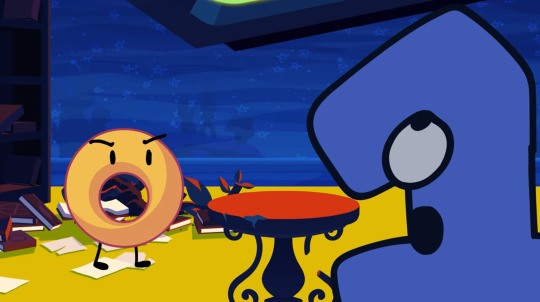
Her demeanour throughout the altercation is something I’d like to bring light to.
One as a character is a manipulator who weaponises gaslighting by learning the characters psychologies to put them under pressure using her facade to sign as we’re all…..very aware by now.
What we learned here is are her downfalls: Temper and ego.
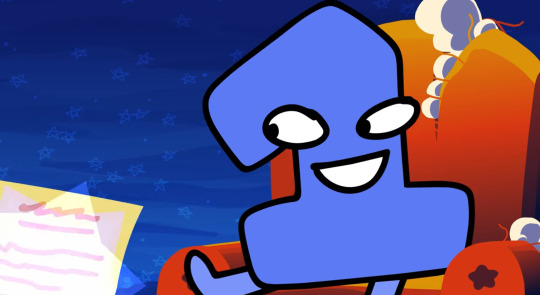
This is the face of someone who’s overly confident in everything she does, here she was not anticipating any failure in her plans.
I mean how could she possibly fail right, after all she’s tricked so many contestants-
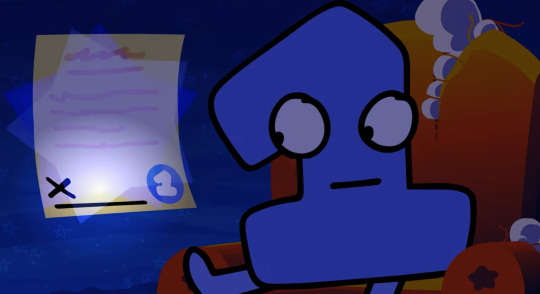
And then reality hits.
Her egos down, she didn’t rehearse for this.
Now: let’s observe who one actually is under her act.
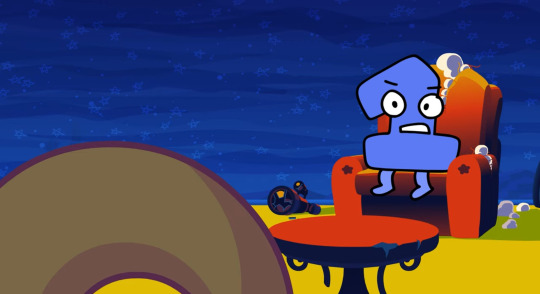
She resorts to violence to start with, trying to get a fear response from Doughnut.
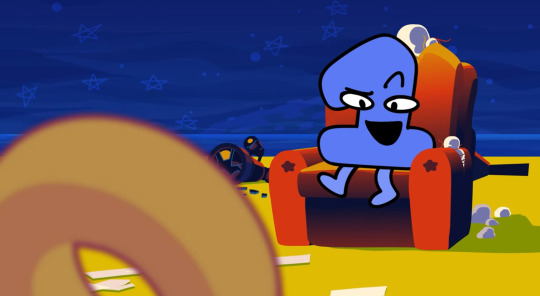
Success: Ego back up tenfold.
She feels safe, like she has the upper hand.
So she starts her downfall: She starts giving Doughnut more information than he should know.
After all he’s going to take the deal, they all take the deal.
He can’t possibly escape and tell everyone after he just signs that little contract.
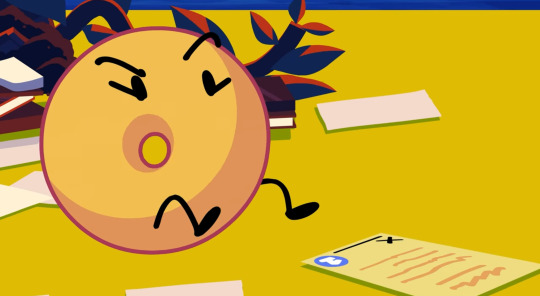
And so like the hawk she is she swoops back in to claim her prize, here she thinks she’s won in crushing the tough nut.
……unfortunately for her Doughnut is smarter then that and questions her, she hates being questioned as it ruins her whole shtick.
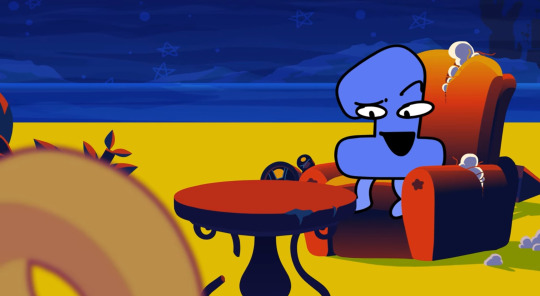
“Ughhh don’t worry about that Doughnut, after all is it so crazy to believe I’m just trying to help you?”
Mocking, condescending, setting up her “finishing blow”.
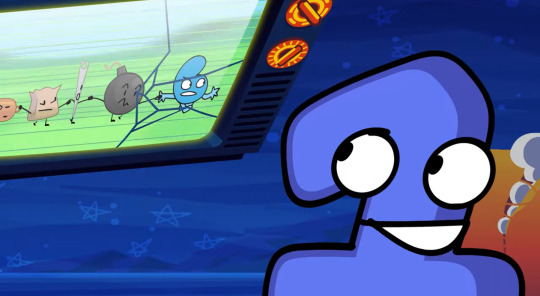
“Those friends of yours all agreed to it and look at all the fun they’re having!”
She can’t help herself and besides he’ll never get the chance to tell anyone so why not take the chance to unconsciously gloat to someone about it?
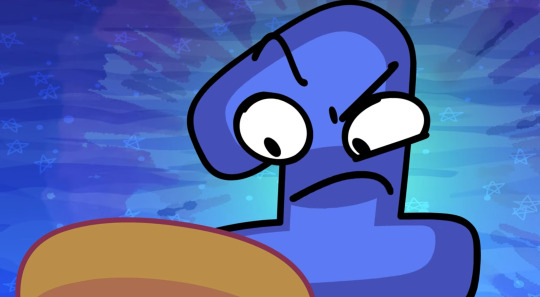
But it doesn’t work, he keeps questioning, second guessing and not trusting her act.
So she snaps and goes nuclear and goes to what she thinks everyone is can’t resist, themselves:
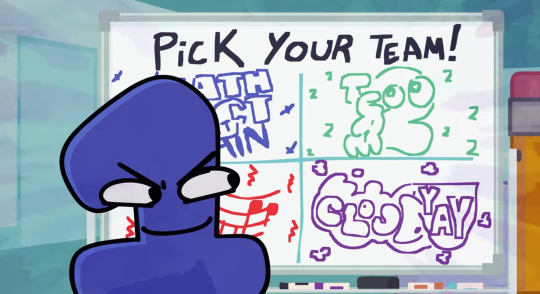
She tries acting like his friend one final little time, going with her plan B she set up.
She lays it all out, everything she knows about him and all the things in his life she rigged to happen in one last desperate attempt to regain control.
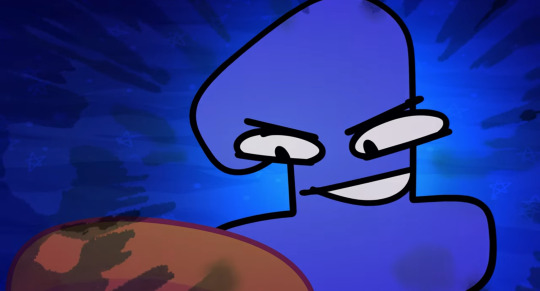
“Everyone gets to be a little selfish, it’s only fair.”
This is the line I’m going to go on a tangent on, it shows why One can do this guilt free.
She’s self justifying it constantly in her mind with a positive feedback loop, through her own delusions she sees fact.
It makes you wonder why she’s doing this and supports what I said last time, I still theorise she’s not here for the power, she’s here to make sure Two is powerless for her own pettiness.
One is a heavily Toxic abuser type person, she has warped morals that she bends to justify their own behaviour to herself subconsciously to get her own goals satisfied.
She has a ego or (at least acts like she has one to further her agenda) and will stop at nothing to the point of almost ending the universe to satisfy her needs.
And if she was friends with Two it would make sense if she used these manipulative tendencies on them and the other algibralians.
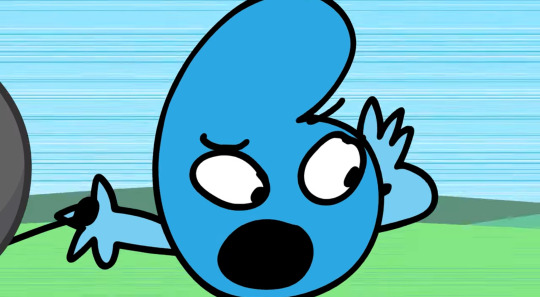
The scene with Six I will now circle back to basically confirms what I’ve been theorising with one quote: “She was supposed to be gone.”.
We have half her motive, this seemingly confirms One was exiled from the playground.
For what is yet to be seen.
Now let’s talk about the ending of the scene: What happens when someone defies her.
Let’s watch shall we:
She’s failed to make this man stoop to her level proving her psychology is wrong so she snaps, she’s never encountered this before.
She wants to feel like she’s won so she turns to a power trip, in a moment of rage she rips Doughnuts legs off and kicks him off to affirm to herself that she got the last laugh here and that letting him go is no issue.
I mean what can one man do without limbs-
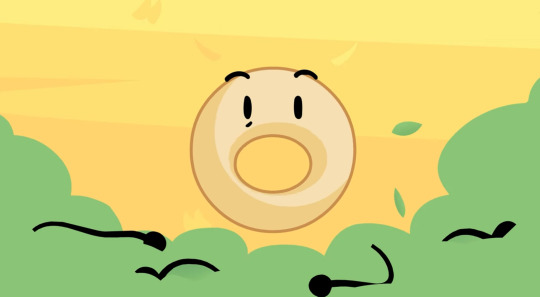
And this right here is where I theorise Ones downfall begins, she got greedy adding Doughnut: a person who she knew could be a problem into the plan.
And where did it leave her?
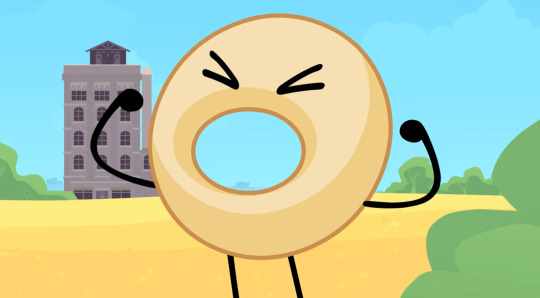
With a wild card with context clues about what she was planning and with information about what’s behind her act on the loose, in her own greed I theorise she set in motion her demise.
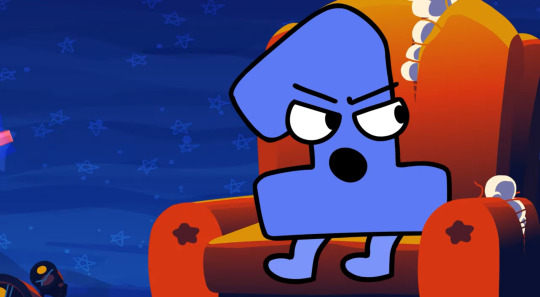
And the kicker is even at the end she’s still affirming to herself that she didn’t really fail here by flying head first into the sun and that Doughnut was “just for good luck.“.
So I end off this essay of a post with a question: If this is how she treats her victims how did she treat her “friends”?
Thank you viewer for reading, the follow up to this will contain an analysis on Pencil (probably my favourite contestant by now) along with a few other misc things I want to talk about as this is already pushing it for this ted talk of a post.
#Character spoilers in the below tags#read at your own risk!#bfdi#tpot 17#tpot 17 spoilers#Memez posting#Osc#object#object show#object shows#object show community#theory#analysis#Tpot#one tpot#Doughnut tpot
270 notes
·
View notes
Text
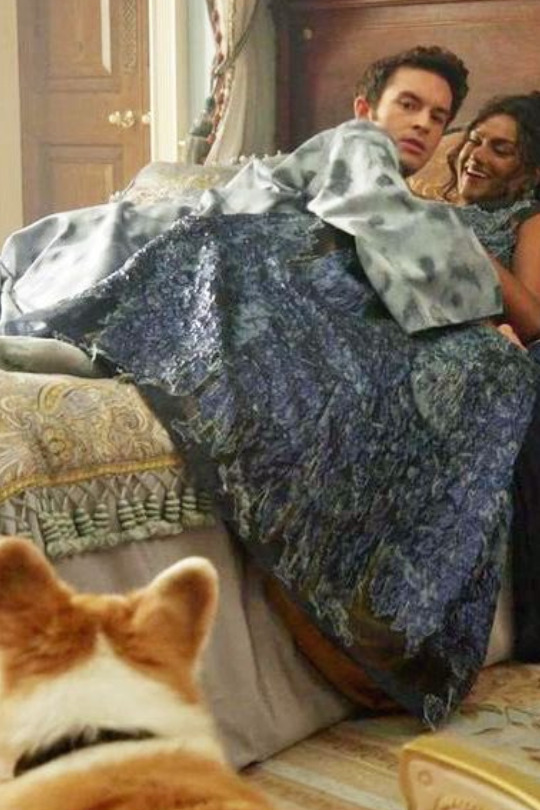
This is objectively the funniest frame of season 3 to me, because you have:
Anthony and Newton legitimately having a face off against each other
Anthony is literally draped over his wife while wearing a silk robe and you can see the top of Newton’s fluffy little head, making this the least threatening standoff in history
But there is very real horror in Anthony’s eyes as he looks at this cute little fluffy corgi
Kate, in the background, acting like this is her own personal comedy and giggling away
#bridgerton season 3#anthony bridgerton#kate sharma#kate sharma x anthony bridgerton#kanthony#newton sharma#bridgerton#bridgerton analysis#it’s objectively hilarious#that Anthony’s enemy is a little corgi#on the one side we have respected 9th Viscount Bridgerton leader of society#married man and soon to be father#a pillar of the Ton#and on the other side we have Newton Sharma-Bridgerton (reluctantly hyphenated)#a corgi#to this day their feud remains legendary#i just 😭😭😭😭
505 notes
·
View notes
Text
While we're on the topic, depiction does not automatically equal glorifying or agreeing with that thing. So if you have a problem with a piece of media just because it has elements that show we live in a fallen world, that is incredibly unrealistic- and then you can't even appreciate 'good Christian' media. Christian literary giants still have those sinful elements in their work just as much if not more than secular ones do. Because you have to show the darkness for the light to pierce it.
The difference between depicting something and glorifying it is how the author uses different tools to depict what they're showing and saying and what message they're getting across with their work. So even if you're just looking at something to chill out on your down time, and don't want to or don't have the mental capacity to analyze it, at least think about what it is saying and why and how it all works together to tell the story and how the worse aspects of it contribute to the central themes.
AND EVEN THEN if a work DOES glorify something sinful because that's what the author believes in and wants to promote, that isn't an automatic no to you consuming that media either. That is up to you to use your wisdom and discernment to see if you can enjoy that media while ignoring or not supporting those particular aspects of the media or if you should blacklist it completely because its so sinful and by consuming it you are convicted that you are sinning, or that it might lead you to sin if you struggle with that thing.
There is more nuance than you think there is in everything. Be wise about it.
#sunkissedliterarylightofchrist#sin#christian#media#analysis#objective truth#nuance#critical thinking
280 notes
·
View notes
Text
no but do you understand that killing gihun would've been the easiest thing in the world for inho to do. the smarter play. like he was right there, weaponless, defenseless, vulnerable and yet, he didn't do it. he didn't shoot him, maim or injure him in any physical way.
gihun, this idealist on a revenge mission, who thinks the world is made of compassionate people. gihun who thinks the system will crumble under the power of the people, who's trying to end the games so to kill this power the rich have over the poor, to give people their lives back. gihun, who at every moment in these games has pushed for the better of the collective, even ensuring his own demise by caring for inho (though, not knowing who he is). gihun, who won an incredible amount of money and could easily live a comfortable life away from these games, who turned his back on that idea because he wants to save people, to collapse the system, to be a hero. it would've been so easy to kill him right then and there. but inho doesn't. and i think that's so so interesting.
yes, it's more painful to kill his friend, and that's the obvious first reason. but under that there's also the obvious 'consequences for your actions' reason. but under even that, i think inho genuinely didn't want to. i think, in his experience of the games, getting to see gihun's good nature, getting to experience his compassion first hand, i think inho saw something in him. be it absolute insanity, or a futile chase of a hopeless dream or a level of tenacious he sees in himself.
if nothing, gihun persists. he spent two years trying to find the recruiter, every round he tries to convince people to quit, his drive to succeed knows no bounds, sees no obstacles. and the same can be said for inho. the games must persist, his work must be complete, nothing will stop him, not even an uprising from some nobodies. in this, maybe inho sees them as the same. not necessarily equals because i do think he still sees gihun as below him but, but. they're not opposites, they're not equals but a secret, third, worse thing. theyre reflections in a cracked mirror, broken in all the wrong places. they're the unstoppable force and the immovable object. inho can't kill gihun because then it would be over. their back and forth, their battle of ideals, their sparring match, their little game. it would all be over. and inho can't have that. because if he killed gihun in that moment then inho wouldn't win the game.
#ive become insane about these two#inho and gihun playing russian roulette but only one of them knows they are#unstoppable force vs immovable object#squid game#hwang inho#seong gi hun#meta things i think#story analysis#inho & gihun#squid game season 2#kind of toxic old man yaoi but im not shipping them here
219 notes
·
View notes
Text
The Unusual: A Character Analysis on Bomb (And OJ, sort of)

Introduction
Wanted to make this post seeing as Bomb's been getting discussion again after the recent remaster episode. It goes without saying that Bomb is a complicated character. He, as with many problematic aspects of II1's story - was undeniably crafted as a mean-spirited ableist stereotype, that was consequently "scrubbed clean" off the face of the series up until the recent season two finale and remaster. And it's true. He is evidently a “writer's regret,” severely lacking in modern relevance, and compared to the intentionally-done stories of Suitcase and Knife - critically underdeveloped as a character.
And yet - I'm drawn to him anyway.
It's hard to argue Bomb is as deliberately written as most of the fuller, modern characters are. Frankly, a large portion of his depth likely wasn't thought about at all, even now - but there is something horribly, and ironically complex about the character he is given. Something that I haven't yet seen discussed in this fandom, or concretely acknowledged by even the canon source. The "overly anxious, bumbling idiot" trope II intended to portray him as, ironically became a self-referential character that has experienced nothing but ableism from other characters, became shaped by his discrimination, and is consequently now a reversal of everything his stereotype limited him to be: affable, easygoing, interpersonally skilled - even teasing and sassy at times.
I want this essay to humanize a character that is so critically overlooked by both his writers and this fandom. I want this essay to show him in a completely different light than what we're used to seeing - Bomb has grown since season one as something more than just "The Unusual". And while no one needs to like him or enjoy him - understanding Bomb, at the bare minimum, is critical to understanding the arcs of plenty of other well-loved characters (namely OJ, who will get his own analysis section in this essay).
There will be obvious mentions and descriptions of ableism throughout. Please take care of yourself while reading. I also want to emphasize that although I try to analyze only what has been consistently established, I also acknowledge that a LOT of Bomb’s scenes generally lack intentionality and there is always the likelihood II could eventually release some episode that completely subverts everything about his character. But what he has now, as of the time of writing this, means a lot to me - and that’s what I want to focus on.
"FALSE ALARM": What it Means, and Why It Fits

There is one other tagline that II gives Bomb beyond "The Unusual"-- and it's "FALSE ALARM,” crudely written on his corpse in the midway point of the season two movie.
And I think, at his very core - this is fundamentally what Bomb is meant to be. It is inherent to his object, even - he is a weapon that harms others, in mass quantities. The whole (initial) purpose of BFDI’s Bomby is to mass kill characters when necessary and freak out when his fuse is lit. And technically, on a surface level, Bomb appears the same way. He blows up when it's funny, his arrival in Idiotic Island causes mass panic, and he screams at the top of his lungs when he sees MePhone's plane fly by at the beginning of season two. But these scenes actually make up only a fraction of his dialogue - and the interesting irony of Bomb is an almost meta-level of self-awareness of what he is, and his attempt to break out of that when he has the autonomy and power to do so.
"Double Digit Desert" in particular points to Bomb's general preference for non-violence and passiveness (or at least, violence that does not involve him blowing up and hurting a bunch of people). Despite clearly having the physical strength and prowess to destroy the desert/his obstacles, his first instinct is to… verbally threaten the fence to move. He is willing to use physical skills to help his ally (OJ), yet interestingly, he abstains from doing so if it would possibly hurt himself or others. The post-ending scene of "The Crappy Cliff (Remastered)" is ESPECIALLY on-the-nose with this - he is aware that yes, he can blow up and kill everyone with ease, but will only do so under the circumstance it helps everyone's problems (that is, getting them out of falling for non-existence). He knows he is made to be a weapon of mass destruction, but actively refuses to live up to that unless given the “yes” from everyone else. His explosions, at least when done of his own will, pretty consistently happens in a controlled environment where it generally won’t harm others/it’s actually needed, in this case.
Yes, Bomb does have plenty of scenes where he DOES blow up and it’s a big freakout scene - but it's incredibly interesting how none of these examples are done out of his own will or to intentionally harm others, despite being an object that could easily get away with it in the same way Knife is justified for being violent... because, well, you'd expect a knife to do that. And you'd expect Bomb to do that too... but he doesn't - because it’s part of him being a “false alarm.” Funnily enough, as pointed out by a dear friend - there’s also a layer of irony that possibly the only scene where Bomb is actually feared is the one that consequently frees everyone from Idiotic Insanity.
Similarly, a great deal of his lines point to Bomb perhaps being way more introspective and socially aware than what we'd expect (or what the ableist stereotype WANTS us to expect) for the "goofy idiot.” His very first line in "A Lemonly Lesson" is him speaking up about Balloon treating Taco aggressively and calling him out for it (and interestingly enough, in the remaster - OJ, the "nice guy character" actually encourages Balloon to treat Taco awfully right after that - acting as a very interesting foil to Bomb). He becomes saddened and seemingly ashamed when Pickle wordlessly admonishes him (for his literal disability) in “War de Guacamole.” In later episodes, he picks up on OJ not caring about him as a person - he just wants to satiate his own savior complex, hence why the whole ""betrayal"" arc happens (more on that later). In spite of it all, he’s even able to separate strategic plays in the competition from his personal relationships (throwing OJ aside to win the challenge - which I want to quickly clarify that characters like Silver Spoon do things like this all the time without it being seen as a reflection on their personal relationships, so I see no reason why this logic can’t also be applied to Bomb) - something OJ actually HADN'T developed yet, hence why Bomb gets confused when OJ takes the betrayal so harshly. And when OJ continuously treats him awfully throughout the rest of season one, he eventually has enough and sassily votes for him in "The Penultimate Poll" (even mocking OJ's self-victimization).
Even his little scenes in the finale further this characterization: he leads Cheesy directly into a pun and beats him at his own wordplay, showing that although the characters around him take him as incompetent or socially inept - he is actually, perhaps, way more socially mature than a great deal of characters.
But at the same time, it’s also INCREDIBLY important to me that Bomb is also, at heart, incredibly sweet and gentle. Obviously he has his moments in season one, but literally every single II1 character was bigoted and/or really mean for no reason (consequence of being written by 13-year-olds, I guess). He did genuinely care about OJ and did plenty to help him, up to a certain point (when OJ admittedly generally did not reciprocate this level of asssistance). He didn't want to be violent against a fence for crying out loud. He openly mourns the death of his best friend by trying to play his favorite game in his honor, his first question about the whole situation being to ask about Pickle - even after he was left in the dark about what exactly happened to him. And even though he was one of the few people who would have legitimate reason to not like Balloon - he (alongside Pickle) was the first person of the II1 cast to invite him to hang out again.
This even applies to OJ (although it's very unlikely Bomb and OJ are really "friends" as much as they are just on passive terms nowadays) - this guy was so, so terrible to him in season one, and yet Bomb shows no sign of what would be very justified bitterness or hurt past that little bit of sassiness in "The Penultimate Poll.” He's a VERY big forgiver in a way while still being pretty firm about not letting himself just get run over (which becomes a very interesting parallel to Paper later on!). So much of his interactions revolve around wanting to assist or help others, too - trying to uplift Cheesy during the redline game or putting everyone out of their misery at the end of II1 remaster, namely. Bomb is one of the characters (like Cabby) that would have every single right to be angry and hurt at the way he's been treated by virtually everyone, even to this day - and yet, he isn't. He is happy. He is gentle. And he likes plants - that just shows how easygoing he is, right? (/silly)
And he can be blunt, just as he can be sassy: he can choose when to be silly and when to be serious. He is NOT as emotionally volatile as his stereotype wants him to be - even his background scenes in season two supplement this, as he quickly puts a pause on his silly dances/reactions to watch Balloon as he enters the hotel in "Rain on Your Charade." Yeah, Bomb definitely has some strange reactions at (admittedly most) times in season two - but so much of his more serious scenes point to this being a choice he makes deliberately, rather than something he just... does because "goofy guy!” I'll get more into why I personally think he does this, but the point ultimately is that Bomb is surprisingly very evenly-tempered as a character, and is perhaps way more socially intelligent than AE even intended him to be taken as.
It all leads back to his coding: being a false alarm. We expect a bomb to be one step away from lighting its fuse and blowing up. We expect Bomb (as a character) to be volatile, reckless, violent. But none of that ever happens. He is composed, soft(er)-spoken, passive, well-meaning - and certainly thinks and speaks much more carefully than what the people around him expect.
Bombjay: It sucks, and that's why we love it (+ a smaller analysis on OJ/Paper)

Of all things Bomb is probably most utilized or known for in this fandom - it's specifically his dynamic with OJ. And for very, very good reason. Bomb and OJ are, undoubtedly - a toxic and power-imbalanced relationship (in the context of canon). It gets to the point that even the writing pretty explicitly blames OJ for everything that happened. That's even the biggest point of criticism Pickle has against OJ during "The Penultimate Poll" - and while OJ acts like the catalyst was Bomb's "betrayal," in my eyes at least - their relationship was actually doomed from its very conception. So long as Bomb's disability began to "inconvenience him" (in other words, just exist at all) - it was never going to mesh well with OJ's self-centered savior complex. It's, although depressing, a golden example of how people very often prop up and parade around with disabled people to feel "good" about themselves for allegedly "saving them" from their lives.
At his core, OJ is a caretaker/provider who is VERY obsessed with being the perfect example. He does not care if you don't want his help - he knows best, and is the most "rational" guy on the team, so it's his “saving” you'll be dealing with for the rest of your life. It's part of what makes his character as the "hero of II" so complicated and nuanced: there are times his heart is truly in the right place, just misguided by true ignorance/not knowing any better. And there are plenty of times he convinces himself his heart is in the right place, when he is in reality being nothing but condescending and snarky. And there are other times where he is just outright rude and cruel to people knowingly, but gives himself a pass because "I'm good everywhere else. It’s fine if I’m mean just this one time.” But the worst part is - OJ is technically validated in his way of thinking. He isn't immediately wrong about being one of the more rational characters. There really isn't any other character in II that would so willingly want to create communal housing for the others or have the willpower to actually maintain it. He knows he is good at what he is doing, and he exploits the hell out of that.
Except Bomb did not validate that way of thinking, and that's exactly where the fallout happened.
OJ showed signs very early on his care for Bomb was incredibly conditional - all the way back in "4Seeing the Future,” he notably gets irritated when Bomb accidentally throws his cookie into the air (rejecting HIS gift!). He happily lets Bomb talk to him when it’s validating his opinions about Balloon in "Sugar Rush," but when Bomb tries to explain how he returned in "Double Digit Desert" - OJ immediately cuts him off and tells him to "forget it." Anything Bomb tries to say that takes longer than two seconds to listen to is immediately brushed off by OJ, who, evidently - is only interested in how he can "save this pitiful guy" to make himself *feel* good. He's not interested at all in what Bomb himself has to say, and that's something Bomb evidently starts to figure out himself toward the end of "Double Digit Desert."
And this is ultimately what leads up to their big fallout at the end of the competition. Of course, Bomb himself isn't a golden standard of niceness (as most II1 characters are) - but I think it's often overlooked that Bomb had only loosely suggested that he should win when OJ immediately retorts that it should be him, because "he's smarter." OJ doesn't think for a second - his ally, who had previously helped him all throughout the challenge - might possibly be deserving of the win, and, while obviously cruel, absolutely shows very explicitly how OJ's tolerance of Bomb was just that: conditional tolerance. Bomb giving even the slightest suggestion that he might not fit perfectly into OJ's savior fantasy instantly shattered any hope of their friendship succeeding past this point.
Coupled with OJ's vaguely ableist-sentiment doubting Bomb's intelligence - I do believe that's exactly why Bomb ends up shoving (and killing) him. It clicks in his head this guy does not care much about him - but interestingly, at the same time, Bomb initially doesn't seem to perceive this act as a betrayal as much as it was maybe a minor disagreement, if not just a strategic way of winning a competition. It's exactly why Bomb gets so confused in the following episode, where he happily goes up to OJ and calls out for him - only to be immediately shut down by OJ, berated, and then ditched for Paper.
So funnily enough - it's not really Bomb's actions that hurt OJ. It's OJ constructing a false image of Bomb in his mind, and when that helpless image of Bomb got broken - OJ betrayed himself, and consequently hurt his own ego.
OJ effectively door slamming on Bomb as soon as that perfect little image got shattered is another HUGE indicator their alliance was, at best: conditional. The moment OJ no longer needs to play into the role of being Bomb's "savior,” he goes completely mask-off in his ableism. He outright states this himself: "I accepted you for who you are!" When Bomb tries to explain himself, he refuses to hear him out and jumps to Paper instead (actually making it a point to state he's only allowing Paper to be with him to "get back at Bomb", in a way). Then, funnily enough, he exhibits the same immediate withdrawal tendencies to Paper themself later on in the episode when he tells them "Between you and Bomb, I feel like I'm in a mental hospital." It conspires all the way to Bomb's elimination, where OJ just HAS to get the last word in about how Bomb "deserves" it for ""betraying"" him.
The slightest bit of resistance, from someone that isn't expected to "resist" - instantly seems to absolutely destroy OJ's world. Every interaction he has with Bomb throughout the rest of the season is literally just OJ trying to make it a point "you did something bad and you should feel bad for me."
All this to say this isn't meant to be an attempt to demonize OJ - it's actually a very critical point of his character development, and understanding exactly where his savior complex later on comes from. Bomb possibly suggesting that his "saving" isn't exactly helping questions his very existence - and it thus results in OJ having an extreme meltdown that leads to him self-victimizing himself, because if Bomb isn't the one in the wrong - then HE is, and that can't be possible, because he has to be a good person. He needs to be the hero. OJ is VERY horribly ableist to Bomb, but in a way, it may even be internalized ableism to himself - not addressing his fixation on being a hero is, in fact, unhealthy and incredibly damaging for his esteem.
But this is where Paper comes in - and is exactly why Bomb and Paper, surprisingly, have two incredibly interesting parallels. Paper is set up as the “same formula, different answer” side of Bomb - their relationship begins in eerily similar contexts. The Paper/OJ alliance starts out with Paper literally below him. It's not Paper giving OJ a chance - it's OJ giving Paper the opportunity of "okay, prove you're better than Bomb." Then when EP/Looseleaf comes into the picture, it evolves into "now how can I save YOU?". I do believe OJ's intentions with EP are more genuine than it was with Bomb - but at heart, it is still the same thing of OJ wanting to save someone. Only, because Paper is much more vulnerable and ""newer"" to socializing, in a way (than Bomb is at least) - they let him. They actively need someone to rely on, and OJ seems to fit perfectly into that mold. Getting rid of EP seems like a good answer to both of them - and when Paper does "overcome their evil alter!!!", OJ gets the self-validation that look, he DID help someone! And now Paper should be indebted to him.
"The Tile Divide" is an all but explicit parallel to "Double Digit Desert": only Paper is a doormat. Their imbalanced relationship with OJ has made them subtly become the “inferior,” and so their solution is to fawn/play into that, rather than Bomb's solution of "I should stand up for myself." Tile Divide is a test to determine whether or not Paper/OJ is going to last beyond the competition, and by Paper allowing OJ to win - and, most importantly, accepting and framing it as "punishment" for them not helping him earlier with his orange juice problem - is exactly what made Payjay last and Bombjay fail. OJ tries to project his fear/insecurity of a similar ""betrayal"" happening again (by calling Paper a traitor/backstabber for trying to go help Taco with her lemon problem), but rather than pointing out that's a silly idea - Paper buckles to the idea instead. They unintentionally cement OJ's perspective as them being "inferior," but they also cause OJ to become very attached to them because they eased his fears about not being needed. It makes their relationship, in the same stroke it destroys it - at least until this power imbalance gets formally acknowledged in "The Reality of the Situation."
Bombjay is complicated. It's messy. But it's a huge part of why both characters are the way they are (and is even fundamental in setting up Payjay, I'd argue). And all of this is largely why I believe Bomb and OJ can never truly become close again - it's likely very similar to how OJ (apparently) sort of just accepts Taco is around again post-finale, even after her “evil reveal.” He gets too busy to care or think too much, although the "betrayal" probably still stings. And in Bomb's case - all that ableism and belittling radically shapes how he starts to act in season two and onwards - but he still isn't nearly petty enough (beyond sassing OJ in "The Penultimate Poll") to carry on their rivalry. And so they both set season one aside, even though the wounds are still there, and they still hurt - but maybe, those wounds sting slightly less if they just keep their space away from each other - and that means not acknowledging the problem anymore as well.
Bomb and... everyone else (and how it shapes him)

Unsurprisingly, it's not just OJ that treats Bomb poorly, though.
It's hard to talk about Bomb without separating him from his stereotype - the writing, both currently and back in II1 - does not treat him well. Everyone sees him in a condescending way. Even the writing sometimes tunnel visions him as just some "goofy guy" that can't do much else but make silly expressions. I don't want to blame the characters as much as I do the writing - but it's hard, when Bomb is pretty much universally seen in an "inferior light" and is very notably treated differently in the plot from everyone else. But at the same time, it's undoubtedly a huge part of why Bomb progressively becomes more passive, quiet, and less outspoken in the later series.
I think "War de Guacamole" is probably the most mean-spirited about this: they very overexaggerate his stammer, and all of the characters stop to stare at him in disdain. Pickle even makes it a point to stare down at Bomb and glare like he's a misbehaving child - over a disability he can't control. II2 becomes more subtle with it, but undoubtedly other characters continue to treat Bomb like a chore/hassle more than a person. Soap proclaims she "shouldn't have to worry about Bomb making a mess" in the first edition of the II comics. When Microphone notices the TV wasn't unplugged in "Through No Choice of Your Own," she jumps to accusing Bomb of plugging the video game back in - and although her assumption isn't illogical, her groaning and tone of voice when scolding him in a manner similar to a child - evidently hints at a condescending attitude that is VERY different from how characters normally address each other. When most other characters get a moment to mourn their loved ones, Bomb is virtually left in the dark about what happened to Pickle as Baseball doesn't reply to his question about his death - while none of these are likely deliberate on any of these character's parts, it becomes a depressingly recurring pattern of Bomb being brushed aside, seen as a problem, or just... not important. It's incredibly similar to the Thinkers infantilizing or treating Yin-Yang like a child/animal - only Bomb gets much less closure in that regard, as he's evidently still seen as a problem.
Personally, I have a lot of beef with how Bomb is written from a meta-perspective still. Too much of his relevance in the finale is just lightly (or sometimes seriously) scolding him for doing "something out of line." He apparently acts out about the video games, he freaks Cheesy out during the red line game, so forth. He has less... normal interactions, and more so needs to be scolded or kept in line by others. And while it's very likely his emotional maturity previously established was just unintentional implications - it goes pretty depressingly against what we've seen prior.
But meta criticisms aside, this ultimately leads me to my main point: Bomb, as established by him sassing OJ, knows what ableism is. He recognizes when he is being treated poorly, and he reacts accordingly. And in this case, it's largely why I interpret his involvement in season two as becoming deliberately quieter and reserved to avoid being belittled. I don't really have as much concrete evidence for this as much as it is just how I personally interpret it. Thus:
The Unintentional Implications/Interpretations of Bomb
I view post-II1 Bomb as a self-fulfilling prophecy in a way. He has become so used to being relegated as the goofy guy people find tiring - that he plays into that to an absurd degree. We've seen in little background scenes that Bomb is very capable of controlling how he reacts to things, meaning his sillier/absurd moments are likely much more conscious than we think. And because it's conscious, it leads to me interpreting this as Bomb avoiding the ableism that's plagued him all his life, by almost trying to play into it. Obviously, he won't stand for someone being as blatant about it as OJ - but it's much easier to not be made fun of if you just... be silly about it, and be quiet.
And in some ways, perhaps it isn't really a conscious decision on Bomb's part to play into this role - maybe it's the ableist treatment of him that has actually locked him into being seen as just a silly guy. Cheesy being shocked that Bomb could actually out-pun him shows that people really don't expect much wittiness from him, Mic/Soap have both established Bomb is seen as a liability at times, etc etc. So even though Bomb acting "ordinary" and "aware" is actually what his personality consistently is (as demonstrated numerous times!), it comes off as a shocker to everyone else because they just assume he's the weird guy. Maybe that is also part of his coding as a false alarm - his coding might not necessarily affect him, as much as it does affect everyone else - warping their perceptions to perceive Bomb as an absurdity or a threat, when in reality he’s just some guy.
But this discussion is largely speculative. The II1 remaster will have a lot of things to add to Bomb, and I don't want to make conclusive statements about anything until it finishes Bomb's story. I will say from what we have so far, however - their rehandling of Bomb definitely plays a lot into Bomb truly being more of an ordinary, sweet, and level-headed guy - just surrounded by a bunch of people who aren't very kind to him.
Concluding Thoughts (Why I Love Bomb - And You Should, Too)
Bomb isn't well-written. I will say that very point blank: he is not.
But he is complexly written (...at least with OJ). No matter how unintentional, talking about his nuance is interesting. His arc is perhaps one of the most important in II1, if not the greater II as a whole for how it builds up OJ in particular. His character is treated cruelly, and yet in that cruelty - I resonate with him, and that's exactly why I think generating discussion about him, well-written or not - is so critically important and fun to me.
And although his current base is not great, I have faith in the II1 remaster for a perhaps kinder depiction of Bomb. I greatly enjoy the additional supplementation they have given thus far - generally leaving his lines alone, but giving his character more weight and intentionality in what he does. He becomes recognized and written for being Bomb - not for his disability (as a mean-spirited joke, that is).
But even without the remaster, I still truly believe Bomb deserves much more than being perhaps the least talked-about character of II1 (second to maybe Salt or Pepper?). OJ is a great part of his character, and Bomb is a great part of OJ's in turn - but both are so deeply complex by themselves that discussion like this can be generated for either in great length, separately. I know a large majority will likely not agree with my more favorable opinion of Bomb, but so long as he might become something more for some person: that is the goal of this essay, at the end of the day.
He is a flawed character, but he, ironically enough - becomes an even stronger character within these flaws. And in my eyes: any character that can generate this amount of discourse in length, has done something right enough to be compelling, even if it’s to just one person.
#inanimate insanity#bomb ii#ii bomb#oj ii#ii oj#inanimate insanity bomb#inanimate insanity oj#long post#character analysis#rhea rambling#object show community#osc#i MIGHT delete this lol im nervous about sharing my thoughts but i got encouraged to post this#if someone says im just making stuff up/demonizing oj i will just Cry#i literally dont hate oj i LIKE his complexity#but the thing is everyone already KNOWS he's a good guy#we don't need talk on that as much as we do him being bad#if its not obvious: i LOVE season 1. a lot. please talk to me about it
113 notes
·
View notes
Text
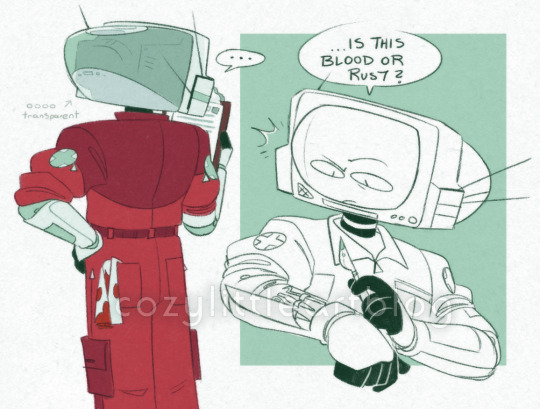
i had a dream i found a whole blog dedicated to blorboposting about val and only val. and that compelled me to draw him
#oc#original character#art#robots#robot oc#robot art#object head#doodles#static sky#val#i mean it was a whole blog dedicated to Just my funny robot guy. even their name and icon matched. filled with shitposting and#reblogged art and fanart and everything. i was flattered but also it was really funny and out of nowhere#blogging about him like he's a guy from a thing and not from a comic that hasn't even started yet#i even remember character analysis posts. which was insane to me because i feel like there's so little i've published#i wish i could remember what their username was cuz i remember it was Good
305 notes
·
View notes
Text
Unstoppable force vs Immovable object but it's cclingy duo
You would think that Tommy - unstoppable force due to him always leading/being the face of the conflict (wether that is good or bad is up to you to decide) and Tubbo - immovable object because he's always the one following,
WRONG
Tommy - immovable object
Tubbo - unstoppable force
Let me tell you why; Tommy's sole motivation (and also fatal flaw) is that he Can't move on, he doesn't like change. He wants to go back to the 'good old days' in L'manburg where everyone was friends and the conflict wasn't real. Before cWilbur's mania transformed him into a shell of the man he was, before cTechno, before cDream, before the discs, before everyone and everything it was cTommy and cTubbo against the world, and cTommy Cannot. Let. Go. He thinks this idealised version of his memories is both achievable and the thing that will make everything Right again. Will make him happy again.
On the other hand, cTubbo Does Not like to linger. cTubbo strives to be as logical and methodical in his actions as he can, meaning that, from early on he learned not to rely on his emotions. Which ultimately makes him reject the past as much as possible.
Who cares if cEret betrayed them, they have way too much power to make an enemy of. Who cares if cTechno was the one who took his second(?) life and caused 3rd degree burns all over his body, he is willing to help him find cMicheal and that's all that matters now.
Plus, with the weight of the L'manburg presidency on his shoulders from a young age, he has to make decisions that benefit the collective/the country as fairly as possible, and make them Quick. He has no time for emotions, or trauma. He bottles both very tightly.
There are decisions to be made, people to protect, things to do. He cannot afford to linger on the past, nevermind he Doesn't Want to. Because thinking about it leads to remembering, and... Thats not a path he's willing to follow. He doesn't let himself feel negative emotions, because he doesn't believe it will result in something meaningful. He doesn't understand how that hurts him more in the end, or better yet, he doesn't let himself acknowledge how that hurts him more in the end.
So... Yeah. This is not an in-depth analysis or anything. This is more me trying to put myself in the mind of the characters. Please feel free to share your thoughts!
#nyx is rambling again#nyx tries to anylise characters#i saw an immovable object vs unstoppable force and cclingy popped into my mind immediately#they make me so sick#dream smp#dsmp#tommyinnit#tubbo#dsmp tommy#dsmp tubbo#dsmp analysis#clingy duo#cclingyduo#c!tommy#c!tubbo#c!clingyduo
151 notes
·
View notes
Text
forever mad that HoO introduced Diocletian's scepter as an object but. gave it to Nico and had Jason promote Frank about it.
Like. Okay here is an object that can summon the dead. It can only be used by a child of Hades/Pluto and a Roman officer in unison. HAZEL IS RIGHT THERE!!!!!
Nico can already summon the dead! He doesn't need a special object for it! Literally IN THE SCENE WHERE THEY GET THE SCEPTER, NICO RAISES THE DEAD. HE'S NOT WEAK ENOUGH THAT HE CAN'T! Hazel meanwhile has never raised the dead before (kind of - she did a little bit like once)! Theoretically she's fully capable of it but she's never properly tried it before! Giving her an object to help facilitate practicing with that would be perfect, especially given the scepter expires after a certain number of uses! Also, since Hazel ends up a praetor in TOA anyways, there's no reason why she shouldn't get promoted to be able to use the scepter all on her own! In fact her getting promoted in the House of Hades would be the perfect place to do so because it's a scene where she's taking the lead and saving everyone else! In fact it's a significantly better place to promote her to praetor over the scene where she ACTUALLY gets promoted! And even if you don't have Hazel promoted instead, then you'd still have it be Hazel and Frank working together to command the armies of the undead, which is perfect because they're a couple and it'd be a great way to show how well they work together!!!!!
LITERALLY THERE IS NO REASON TO NOT GIVE IT TO HAZEL. WHAT'S THE DEAL.
#pjo#riordanverse#hazel levesque#cant remember if ive made a post complaining about this before but if so I WILL DO IT AGAIN#i do have another separate joke about potential themes of the Cupid Scene revolving around diocletian's scepter#and like. it is *technically* serious meta but the way i phrase it is 80% unserious#like technically yes it is a legitimate potential analysis about some themes you could draw from that scene#but i simply choose to phrase it like ''😳😳😳😳'' because thats objectively the funniest option#< for the record i. do not think i can say that theory on this blog lol. i try to keep this blog a specific rating#but i think it makes itself pretty self-explanatory
231 notes
·
View notes
Note
do you have any idea what that stare rodney gave o!c's cane and shoes was about? i'm totally stumped on it and can't find anybody speaking about it unless i'm blind and my tl is bare cos i'm not following the right people, and i thought maybe i was related to sizing up sebas' efforts as a servant but i don't know... it's just a very condescending look period like why the side eye... ungaggggg...
AHHH I THINK I KNOW WHY
i have been thinking about it a lot recently actually.
WHY DID RODNEY STARE AT CIEL IN CHAPTER 214?
the glaring is directed towards ciel's accessories, his shoes and his cane. not ciel himself.
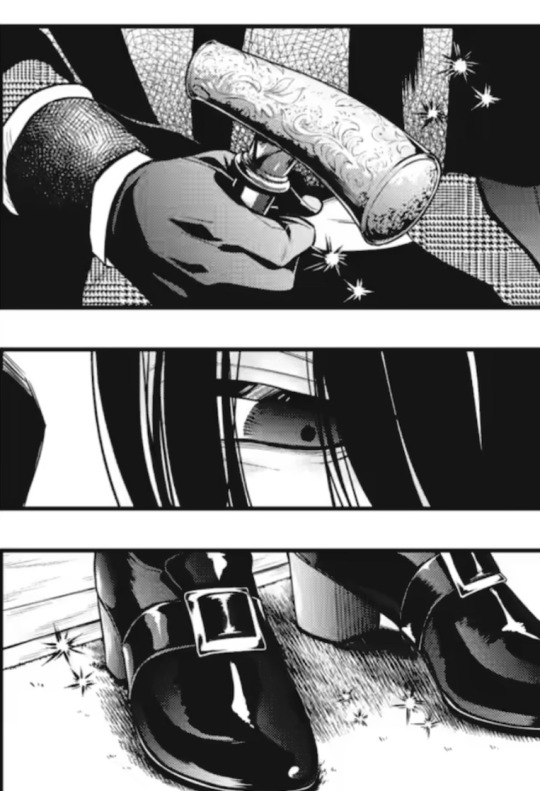
every time these features specifically were focused on, it is to remind us ciel is a child. for example chapter 2, the old man calls ciel a child while delivering the cane.
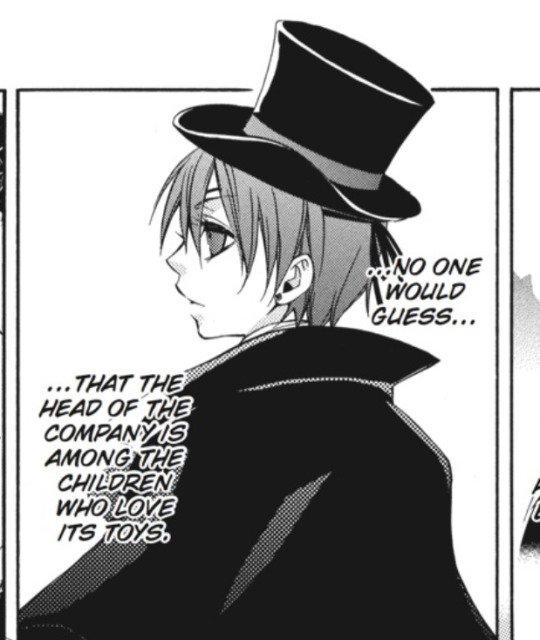
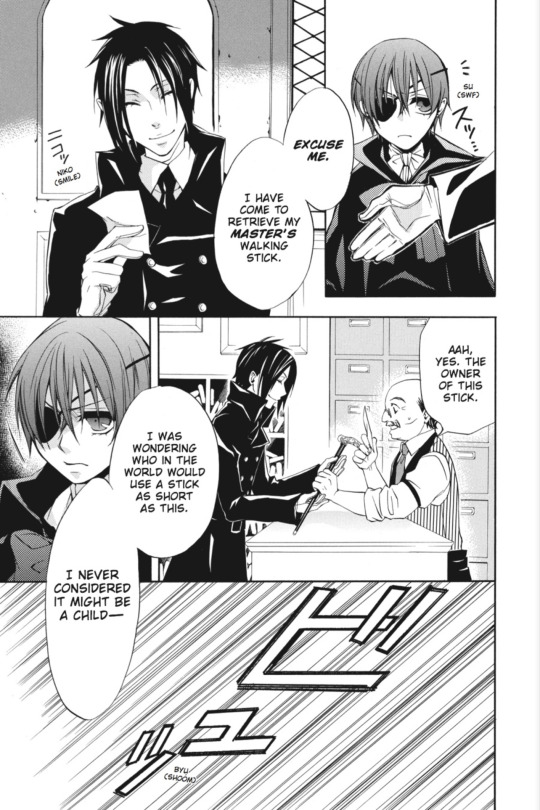
his demeanour towards joker/doll completely changes once he's dressed. joker sardonically points out that ciel truly is a noble once ciel is dressed and acts like a noble and doll doesn't initially even believe o!ciel is lord phantomhive bc she's so used to his circus disguise.
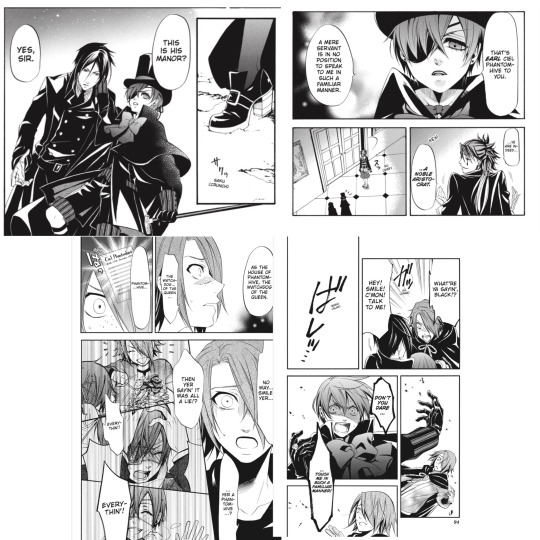
elizabeth's big character moment in the campania points out o!ciel's attire as aiming to look older.
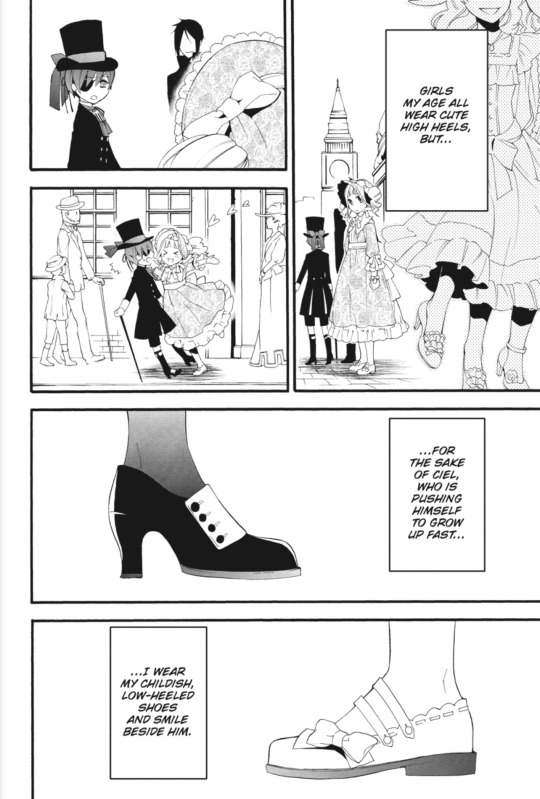
when he runs towards sebastian in the green witch arc, at the end of his run when he finally screams sebastian's name, he's adorned with...
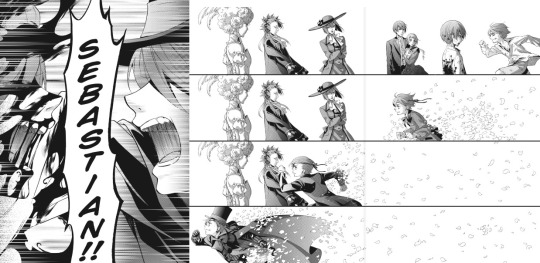
his hat and heels (but no cane, he's running lol)
honestly? i think these panels are supposed to be showing us how these things make ciel who he is (his identity) for example art book 4 has these cool collages which represent sebastian and ciel.
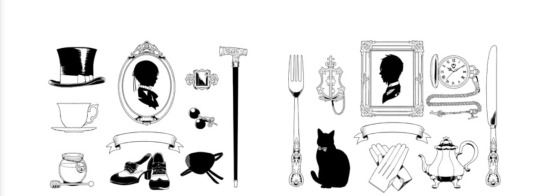
o!ciel's includes his eyepatch (contract), his earrings (scars of that night- his ear was pierced to put a price on him), his ring (his family/role as watchdog), a teacup (ties in with the teapot on sebs side) and honey (symbolising his night terrors/on going trauma)... but there's also his cane, hat and shoes- all of which he has on right now in the story. it's interesting, while sebastian has his knife and fork, ciel doesn't have his gun. instead, it is his clothes—these are what he uses as "weapons" so to speak. with them, he appears older and visibly seen as nobility. his front to protect himself.
while for sebs it's his gloves (contract), his watch (which can symbolise a lot of things actually... mainly that his time as sebastian the butler is finite. eventually it will run out), his head butler pin (his role as butler, it used to be tanaka's and we know how important it is thanks to the murder arc), the teapot (maybe to match the teacup, he is serving the tea after all), a cat (akin to the honey on ciel's side, it is what brings him comfort, as seen by his response to see one after he was kicked out of the music hall by blavat)... and finally the knife and fork which are his weapons.
ciel's identity/weaponry/relationship with sebastian are intrinsically tied to the clothes he wears. rodney looking at it implies that he will challenge ciel's identity, weaken him or aim to cause the deterioration of his relationship/contract with sebastian.
other possible reasons is simply to show how much the hotel personalises the experience of each guest (by examining them closely), foreshadowing how creepy rodney will be towards o!ciel, etc...
OR HE COULD BE WONDERING WHY THEY'RE BRAND NEW!!!
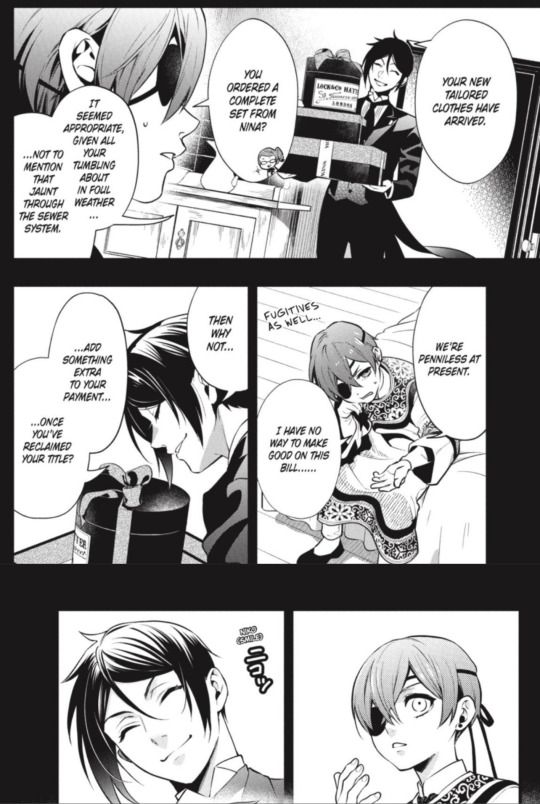
sebastian ordered a full set!! unprovoked, without being asked to. it's a "i believe in you" moment, akin to the public school arc one:
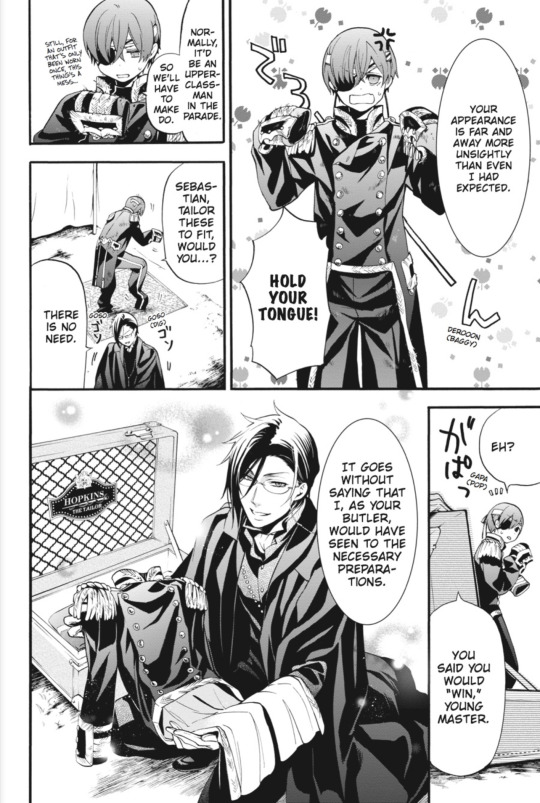
sebastian always sends an order off to nina whenever he wants to express genuine support for ciel. but rodney doesn't know that. we also don't know how he managed to make good on the bill, he either used his own pocket money (which we know he has since he gave some to finny in one of the earlier chapters in volume 2, i believe)
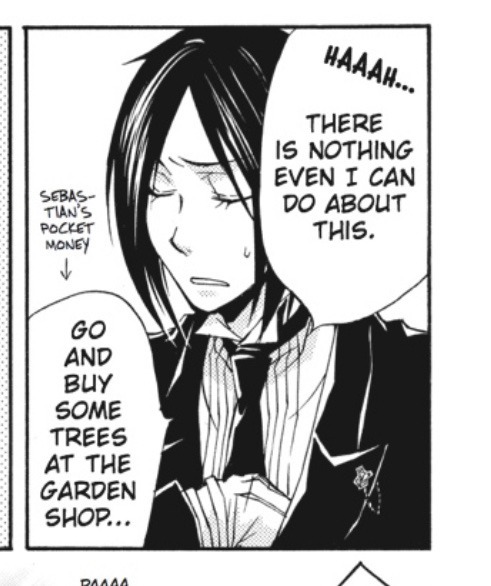
or he managed to convince nina that o!ciel will pay her later (which is equally possible). whatever he did, he got a fugitive good-quality clothes from his usual tailor; rodney might be curious about that.
i hope this helped, anon 💜🩶
#especially if rodney is a demon#or a supernatural#it might be 'why is this guy doing the most for this little shithead' type of stare#not really a ship post#but you can take it that way#this is an analysis on the fits and objects more than the characters#sebastian michaelis#ciel phantomhive#character analysis#kuroshitsuji meta#kuroshitsuji#black butler#chapter 214#syanalyses
63 notes
·
View notes
Note
excuse me have you ever explaned why you hate losercake
buckle up because this is gonna be a long response.
cake is one of, if not my favorite bfdi character, and he has been for a very long time. i saw a lot of myself in him and eventually started looking deeper into the details of his personality, his actions and his general character, and i realized, loser did not leave a positive impact on him in any way whatsoever.
let me explain.
at the start of bfb, everyone loves loser. cake included, obviously. cake ends up 'lucky' enough to be in a team with him, a team where everything everyone did always revolved around loser. loser was the 'driving force' behind his team, just to receive all the praise and love from his adoring fans. this, however, is as far as he would go in terms of forming bonds with his team.
at least, that was the case with everyone except for cake.
we know from an episode in bfb B that he wanted to keep that praise from his fans, and to have them never question his judgement or plans.

to keep his fans' trust and devotion towards him, he'd need to constantly present as likeable and friendly, and an easy way to do that is by forming a slightly deeper yet still extremely superficial relationship with one of his adoring fans, in this case, cake. that's when the nudging started. the nudging loser always did to cake whenever it was cake at stake. and of course cake was at first ecstatic to be noticed by his idol ! however, i believe cake was uncomfortable in regards to the joke being made.
you see, when leafy rejoins and gifts needle the 3d cake, you can see cake distraught at the sight of needle eating it, making it safe to assume cake heavily dislikes the visual or idea of cake being eaten, even if it's not sentient like he is. look at this screenshot from the sceen where he sees needle eat the cake
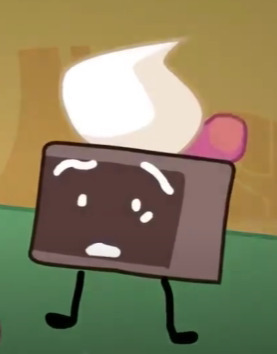
that is not the face of someone who's comfortable with jokes about his object being eaten
but he could never reveal that he was uncomfortable with a form of affection THE loser was giving him. not only would he look bad in front of his idol, but his team was so loser-centric that the slightest criticism would make them violent [for example, in bfb 1 when pin points out they should do the challenge instead of gushing about loser she THROWN INTO THE AIR BY FIREY]. so of course, he played along
and so, this continued on for the next few cake at stakes in bfb A. four or x would mention the safe contestants would get cake, loser nudged cake, cake blushed and gasped. and cake started to lean into the "loser's favorite" bit [take, for example, bfb 6 where he leans into loser after hearing bell bash into the basket they were hiding in], because he was trying to make sure even he believed that the shallow affection loser gave him held some sort of significance, and that pushing his own comfort away for the sake of looking good in front of loser [who was not only his idol, but an important figure amidst all the contestants] and his team was the right call.
but then came bfb 7, and loser was both hated and eliminated. so many people started revolting against him, surely cake can finally let that sealed-up frustration out right ? and so he shouts, "he's gone for a reason". what is he met with?

hostility.
cake, in an attempt to show his true feelings about loser, was immediately pushed down and reproached for it. so he continued to hold it in and when met with hostility, one is hostile in return, and so he starts expressing his frustration in some other ways. take bfb 13 for example, he starts arguing very loudly with eggy about who's "more spiritually connected to loser", which is a very abrupt and confusing shift from his usual polite, gentle self.
WHICH. THAT ARGUMENT BRINGS ME TO ANOTHER POINT. since he was "loser's designated favorite", someone claiming they were closer to loser probably felt so Wrong to him. HE was the one who kept getting nudged. HE was the one loser always addressed. HE was loser's favorite, even if he didn't particularly want that role. he kept up the act of "loser's favorite" long after his elimination, because what else was he supposed to do. that's all he was.
so, during the time between loser's elimination and the beginning of tpot, cake was more aggressive and rude, because it was his only method of releasing the frustration he was feeling. it was mainly towards loser and the general situation, but one could argue part of that frustration could've been towards himself.
anyways, we skip forwards to tpot. cake, despite his anger, still cares about his friendships, which is why in tpot 1, he's disheartened at the sight of having to choose between clock or eggy, two of his friends, and then being completely deserted by eggy.

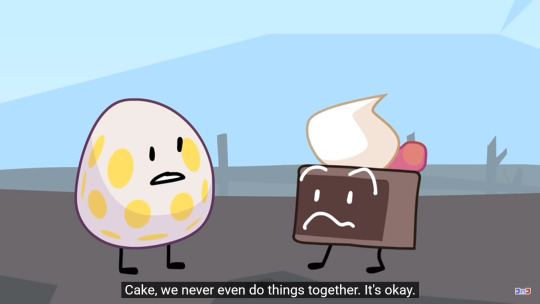
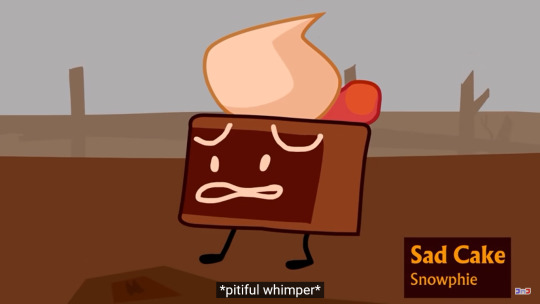
however, he eventually joins just not, and you can see throughout his time in tpot prior to his elimination, he is visibly much happier than when he was part of the losers. i invite you to look up the "bfb but only when cake is on screen" and "tpot but only when cake is on screen" videos, and you WILL notice the increase in positive cake reactions and dialogues in tpot.
for my final argument, i present his elimination speech. i present to you the full transcript of his final words as a contestant in tpot 8:

he SPECIFICALLY mentions how he was so happy to not be playing for loser, but for himself. he was finally having fun, with a team that he loved and was loved by. if he truly enjoyed loser's presence and attention, if he truly enjoyed being his "favorite", he wouldn't have mentioned this at all.
so yeah. cake doesn't like loser, loser doesn't care about cake. if you dont agree with any of this and STILL think losercake is a good ship then please just block me. don't try to convince me to like losercake because i am not budging from my stance. as i stated before, i see a lot of myself in cake, and maybe this is all self-indulgent and projection and whatever, but it's how i see his character. and it makes me really sad that people call him bland or only see him as "loser's favorite" because he's so much more than that. i could go more in depth about his general character, but i was merely asked to explain why i dislike losercake. so here you go ! this is my reasoning. do with this what you will.
tldr; cake did not like being loser's 'favorite' and merely played along with loser's attention to not look bad in front of his idol and his fellow contestants. he was one of the contestants that talked bad about loser after his elimination in bfb 7, and pointed out how he was happy to play away from him in tpot 8. the fight cake had with eggy in bfb 13 about who was "more spiritually connected to loser" was his way of releasing his frustration, as he was reproached for speaking ill of loser back in bfb 7. he is not bland or one-dimensional, you just probably didnt pay enough attention to detail.
#thief chitter#thief talks#character analysis#bfdi#cake bfdi#bfdi cake#cake bfb#bfb cake#tpot cake#cake tpot#tpot#bfdi tpot#tpot bfdi#bfb bfdi#bfdi bfb#bfb#loser bfdi#bfdi loser#loser bfb#bfb loser#osc#object show community
61 notes
·
View notes
Text
Absolutely in love with how fucked up the concept of recovery centers are in BFDI.
Thinking about how in the 1st season, there were barely any recovery centers, but by TPOT, there’s a giant recovery center that will conveniently recover anyone & everyone in seconds.
Thinking about how in BFDI 2, Leafy is absolutely distraught about accidentally killing Ice Cube. Cut to TPOT 14, where the contestants are completely okay with killing, to the point that entire teams will die at a time.
Thinking about how since the normalization of recovery center, the characters are now basically immortal, & are completely numb to the concept of death. They kill off left & right because they KNOW that their friends are coming back.
Because now that the contestants have grown used to recovery centers, they’ve started to take them for granted. It’s only been about a decade, but the challenges have grown so dependent on the recovery centers, that it’s impossible to finish an episode without seeing at least 5 characters die in some way.
#A society that’s grown so dependent on its artificial immortality#to the point where if those machines were to shut down everything would fall in shambles#I sure love the funny haha object show made for kids haha funny#battle for dream island#the power of two#bfdi analysis#the speakerrr#analysis#object show community#object shows#osc#bfdi#tpot
235 notes
·
View notes
Text
I know it's well-understood at this point that Kirk/Spock is much more of a nerd4nerd ship than a nerd/jock thing, but it's just been kind of percolating around my mind that both of them aren't just space nerds but space nerds who were personally bullied.
Like, 18-year-old Kirk was targeted by an older bully who combines "total asshole" with "the most grating man in existence":
MCCOY: Well, yeah, I'm beginning to feel a little bit picked-on, if that's what you mean. KIRK: I know the feeling very well. I had it at the Academy. An upperclassman there. One practical joke after another, and always on me. My own personal devil. A guy by the name of Finnegan. MCCOY: And you being the very serious young— KIRK: Serious? I'll make a confession, Bones. I was absolutely grim, which delighted Finnegan no end.
This was five years after Kirk survived a genocide, btw, and likely well before his stint as an Academy instructor known to be strict and demanding (which is the period the "stack of books with legs" description of him comes from). By the time he's 33, fifteen years after all this, it turns out one of his deepest fantasies is just beating the shit out of his bully, but only if he can do it According To The Rules (the replica of Finnegan sneers, "Always fight fair, don't you? True officer and gentleman, you").
Spock, meanwhile, is viciously targeted by his Vulcan peers for being biracial from at least age 5; he's described as being tormented by other boys by that age, and "at home nowhere except Starfleet." I think he'd have been 18 or 19 when he left for Starfleet and it's... the least bad of his options, but he seems to have spent his entire career among humans and being persistently subjected to raw racism and profound disrespect for his culture at every turn.
Like, their histories of being metaphorically shoved into lockers are not identical or anything, but I think it's interesting that they both have them.
#i feel like kirk and mccoy are generally seen as more temperamentally aligned despite kirk being emotionally closer to spock#spock representing cold logic and kirk and mccoy as the passionate emotional ones#but i feel like a) spock is wildly emotional just repressed. and coolly utilitarian in philosophy. and usually undemonstrative.#b) mccoy is highly intelligent and sometimes VERY much the voice of reason#(not typically cool rationality but certainly reason - he puts together clues that the others don't see on multiple occasions#he's not as easily derailed by obscuring details or over-cerebral analysis paralysis as the other two imo)#c) but mccoy sometimes struggles with the really big emotional shit and spock is more on kirk's emotional wavelength there#(this is especially obvious in conscience of the king and turnabout intruder but not only there - in both mccoy resists seeing#the full horror of the violations of the most basic rights that kirk has endured while spock is much more sensitive to those things)#and d) kirk is emotionally expressive but typically more cautious and measured in judgment than either of the others#more likely to formulate positions in terms of philosophical principles than mccoy's kneejerk sense of decency#(which sometimes is exactly what's needed and sometimes disastrously lacking in rigor and reflection)#or spock's often brutally utilitarian focus on outcomes that runs roughshod over... like. everyone.#that's why kirk is the mediator; he's not at the exact midpoint in every dispute#but broadly his personality and strengths/weaknesses fall pretty evenly between spock and mccoy#(interestingly i think this is especially noticeable with kirk's infamous seductions - which are rarely motivated by simple desire#they combine the focused perception and expressiveness of mccoy and the brutally self-denying calculations of spock#when sylvia exclaims that he seems warm and passionate but his mind is cold it's like... yeah. softly lit femme fatale james t kirk#it's like the unholy side of kirk's overall approach borrowing pretty equally from both mccoy and spock)#ANYWAY the point is that i don't think kirk is actually more similar to mccoy than he is to spock#and in particular his tendency to repress the horrors and focus on useful concrete action are very akin to spock#long post#anghraine babbles#star peace#otp: the premise#c: who do i need to be#c: i object to intellect without discipline#star trek: the original series#anghraine's meta
142 notes
·
View notes